Blogging has been around since the late 1990s and has become one of the most popular mediums for people to express their thoughts, share information, and generate income. If you’re thinking of starting a blog of your own, it’s important to understand the steps needed to be successful. In this post, we’ll provide a step-by-step guide on how to start a blog. So, let’s dive in and explore the possibilities.
- 1 What is a Blog?
-
2
How To Start a Blog: Step by Step
- 2.1 1. Set a Goal for Your Blog
- 2.2 2. Pick the Right Niche
- 2.3 3. Select a Domain for Your Blog
- 2.4 4. Choose Your Hosting Platform
- 2.5 5. Build and Design Your Blog
- 2.6 6. Create a Content Strategy
- 2.7 7. Write Your First Post
- 2.8 8. Optimize Content for SEO
- 2.9 9. Use an Editorial Calendar to Post Content Consistently
- 2.10 10. Monetize Your Blog
- 3 Final Thoughts on How to Start a Blog
- 4 Frequently Asked Questions (FAQs)
What is a Blog?
A blog is an online platform where you can regularly publish and share content. It acts as a digital journal or online diary, allowing people to express ideas, experiences, tutorials, or opinions on various subjects. They can cover multiple topics, provide a space for writers to connect with others, and create a community around published content. With the ability to incorporate text, images, videos, and interactive elements, blogs offer a dynamic and accessible resource for sharing information and fostering an online community.
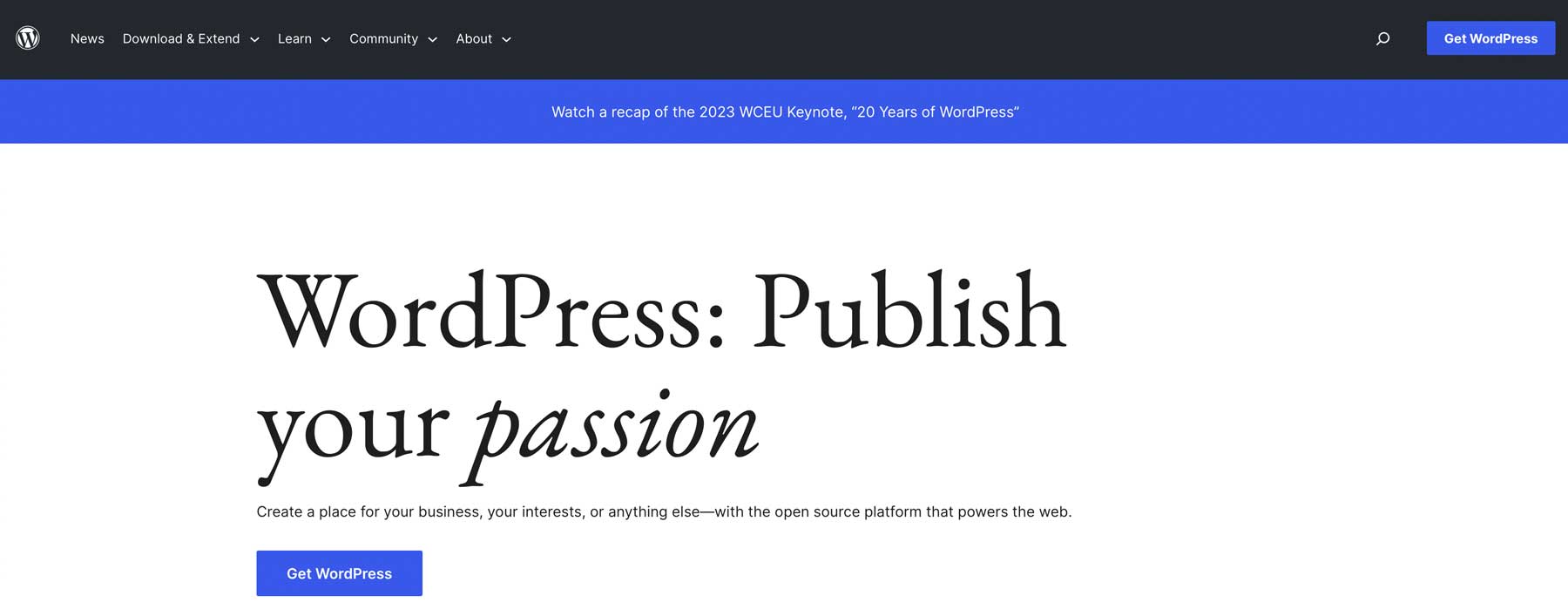
One of the most popular platforms for a blog is WordPress. There are two iterations of WordPress: .org and .com. Either one will suit your needs, but it’s important to understand their differences. WordPress.org is a self-hosted solution, which means you install and host the software on a WordPress hosting provider. On the other hand, WordPress.com offers a blogging platform with its own hosting, which can be a solid choice for beginners. For this tutorial, we will focus on the .org version of WordPress and walk you through the steps to launch your online blog.
How To Start a Blog: Step by Step
Subscribe To Our Youtube Channel
To succeed at blogging, it’s important to set goals, determine who you intend to cater to, and pay attention to more technical considerations. These include picking the right host, choosing a worthy platform, and incorporating all the moving parts needed to support your efforts.
1. Set a Goal for Your Blog
The first and most important step in the process is planning. Sit down and list what you’d like to accomplish with your blog. Are you interested in monetizing your blog? If so, research how you want to turn your blog into a money-making machine. Consider whether you want to run ads directly on your blog or use other methods, such as Google Adsense. You can also incorporate a good advertising plugin that will allow you to create and host banner ads on your blog quite easily.
Consider creating an informational blog if monetization isn’t in the cards right now. These types of blogs are a great source of information and tend to perform well in search results; that is, if your SEO copywriting is up to par.
Lastly, decide whether to incorporate social media into your blog. Having a social media presence on your website is a wonderful way to drive more traffic to your website. There are a lot of excellent social media plugins available that will allow you to embed social feeds, schedule posts to Facebook, or incorporate events.
2. Pick the Right Niche
The next thing to evaluate is whether you want a lifestyle blog that encompasses various topics or drill it down to be more of a niche blog. In general, niche blogs are great for people looking for specific information on a topic versus a more generalized lifestyle blog. There are several benefits to creating a niche blog, including appealing to individuals with particular interests, being excellent for building email lists, and, most importantly, being easier to manage.
3. Select a Domain for Your Blog
The next crucial step in the process involves securing a domain name, which plays a pivotal role in shaping your online presence. When choosing a domain for your business, it’s important to ensure that it is both memorable and easy to spell, while accurately reflecting your business’s niche. While various top-level domain (TLD) extensions are available besides .com, opting for this widely utilized TLD is often best due to its trustworthiness. However, alternatives like .net or .org can also be considered, particularly if your preferred domain with the .com extension is unavailable.
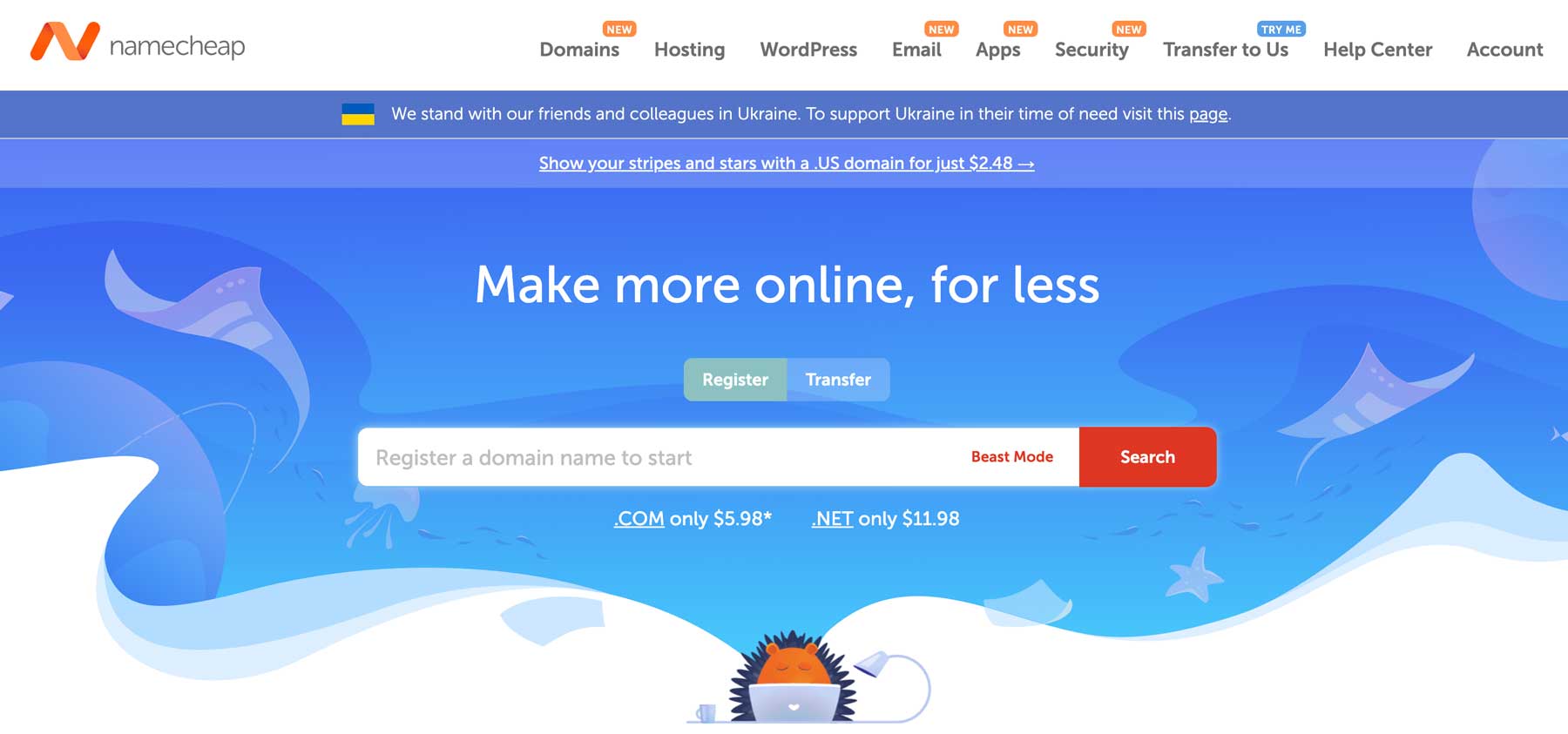
In certain cases, it is possible to acquire a domain that has already been taken, although this can be challenging, especially if the desired domain already has an associated website. To explore available domains, we recommend using a reputable domain name registrar such as Namecheap.
4. Choose Your Hosting Platform

Once you’ve planned out your blog and chosen a niche and a domain, you’ll need to find a good hosting provider. Generally speaking, you’ll want to avoid free hosting platforms and opt for a good managed hosting provider like SiteGround, because they offer the most bang for your buck. Not only do they provide competitive pricing, but they’re one of the fastest hosting companies you can get.
A fast host is crucial to your blog’s success for several reasons. First, no one likes a slow website. Potential readers who land on your site and wait for the page to load aren’t going to stick around. Secondly, a fast website is good for search engine optimization (SEO). Because Google and other search engines prioritize speed, going for a quality host is in your best interest.
5. Build and Design Your Blog
Now that you have all of the necessary moving parts in place, it’s time to start the exciting process of creating your blog. In this section, we’ll advise you on the best blogging platform to use, recommend a good theme and plugins, and walk you through the process of setting up your categories, tags, and templates.
Pick a Platform
While there are many blogging platforms to choose from, they are still far from matching the versatility of WordPress.org. With full site editing capabilities and a platform that was built for blogging, WordPress is the way to go. It’s free to use, has a huge following, and provides endless customization options. Plus, it’s relatively easy to learn, making it a great solution for beginners.
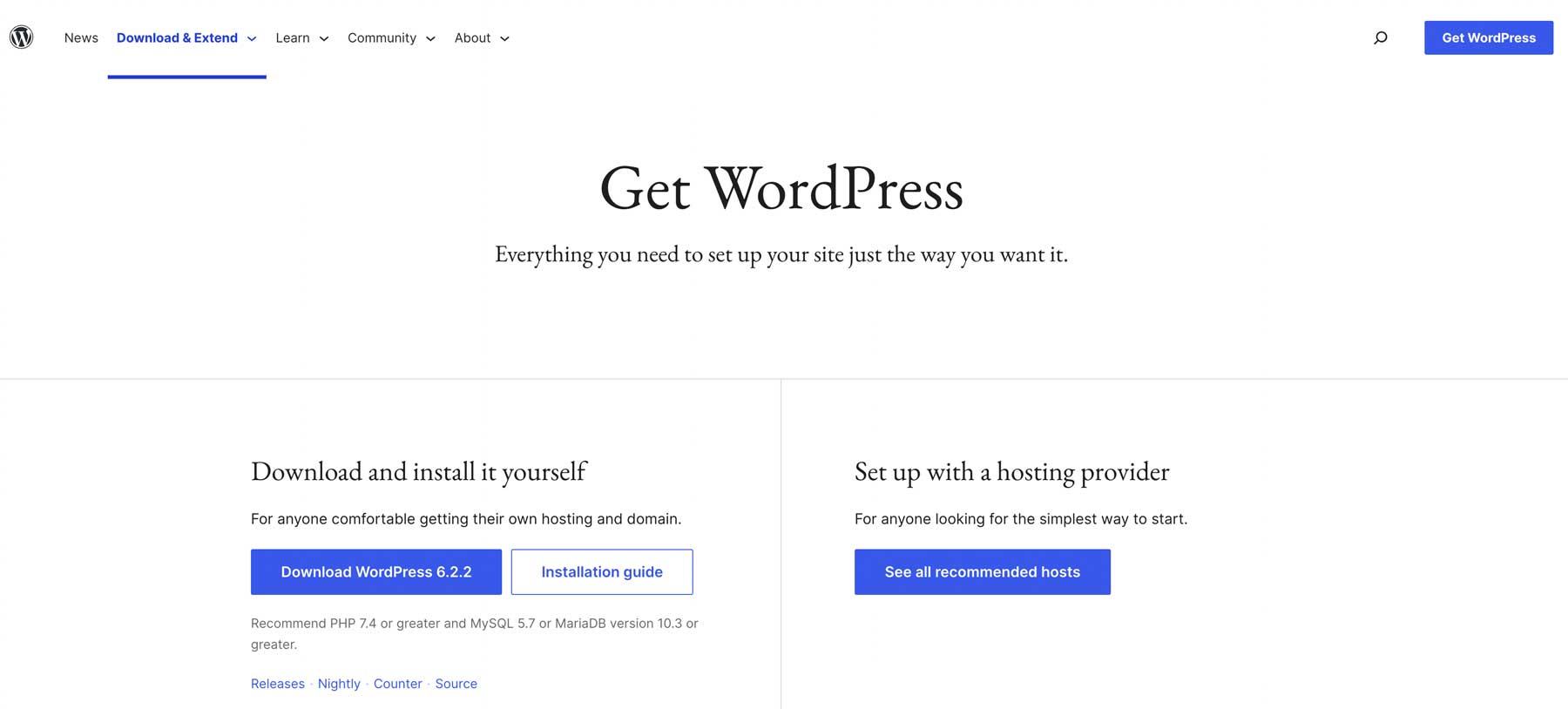
When it comes to installing WordPress, you can usually leave the dirty work to your web host. The best WordPress hosting providers will install WordPress for you when you set up your account, making your life a lot easier. However, that also depends on the hosting you choose. Most VPS hosting or dedicated hosting companies won’t offer this feature, requiring you to install it on your own through cPanel.
Pick a Theme

Now that we’ve opted for WordPress.org as a place to build our masterpiece, we’re going to need a good WordPress theme for bloggers. Although we may seem a bit biased, Divi is the absolute best solution. With the ability to create pages using a no-code Visual Builder incorporating more than 200 design elements, Divi is capable of showcasing your blog beautifully.
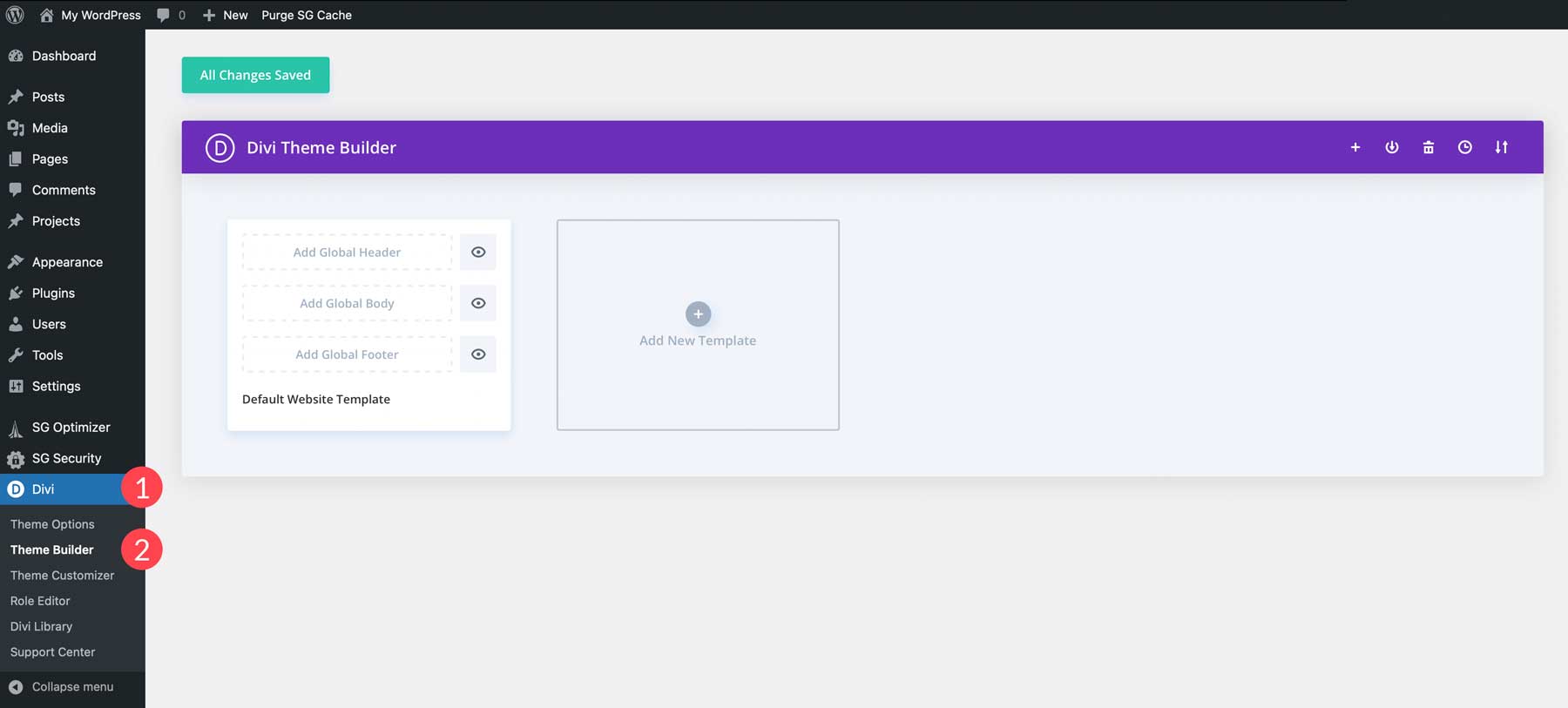
Plus, you’ll gain the benefit of full site editing, which allows you to create custom templates for your posts, categories, tags, and more, through Divi’s Theme Builder.
Install Key Plugins
One of the best aspects of WordPress is the ability to install plugins. They add features and functionalities to your site, allowing you to build any website you wish. For example, if you’d like your blog to have gated content, you can install a membership plugin, set up a paywall, and you’re off to the races. There are plugins for literally anything you can fathom. You can get a little help getting seen in the search engines by installing a good SEO plugin, such as Rank Math.
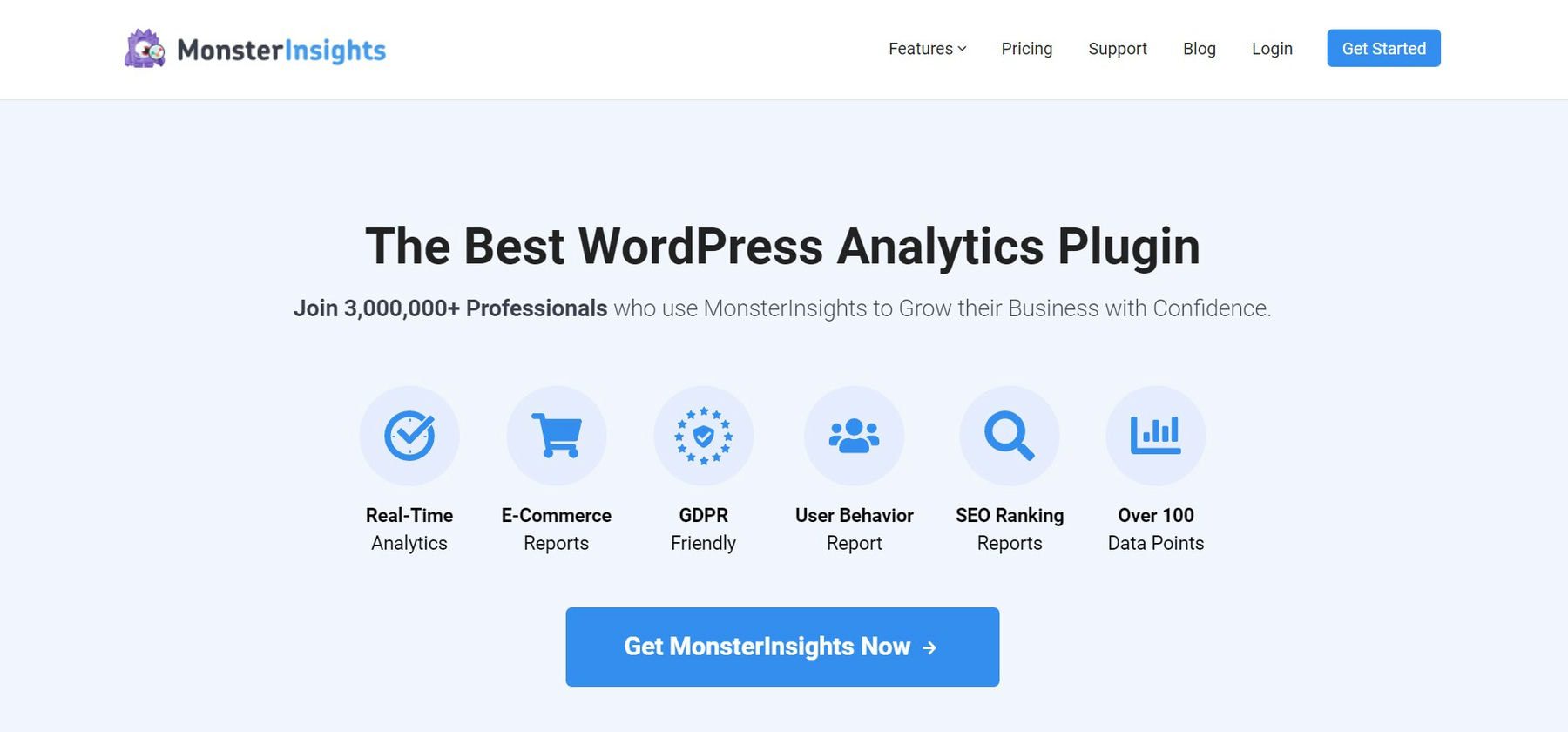
Furthermore, you can track how your posts are performing by incorporating a plugin such as MonsterInsights, which provides crucial information on what’s working on your site and what’s not. This is especially important when you’re just starting out. No matter what you want your site to do for you, there’s a plugin for it. To help you determine what you need, take a look at our article, 31 Best WordPress Plugins (Everything You Need).
Set Up Categories
Before you can start writing posts, you’ll need to create categories. Using categories is an essential part of SEO and, if done correctly, can help bring traffic to your website. For example, let’s say you’re building a blog about pets. You’ll want to create categories for the types of pets you want to write about and subcategories that would pertain to those pets.
To add categories, navigate to the WordPress dashboard, then hover over posts. Next, click categories.
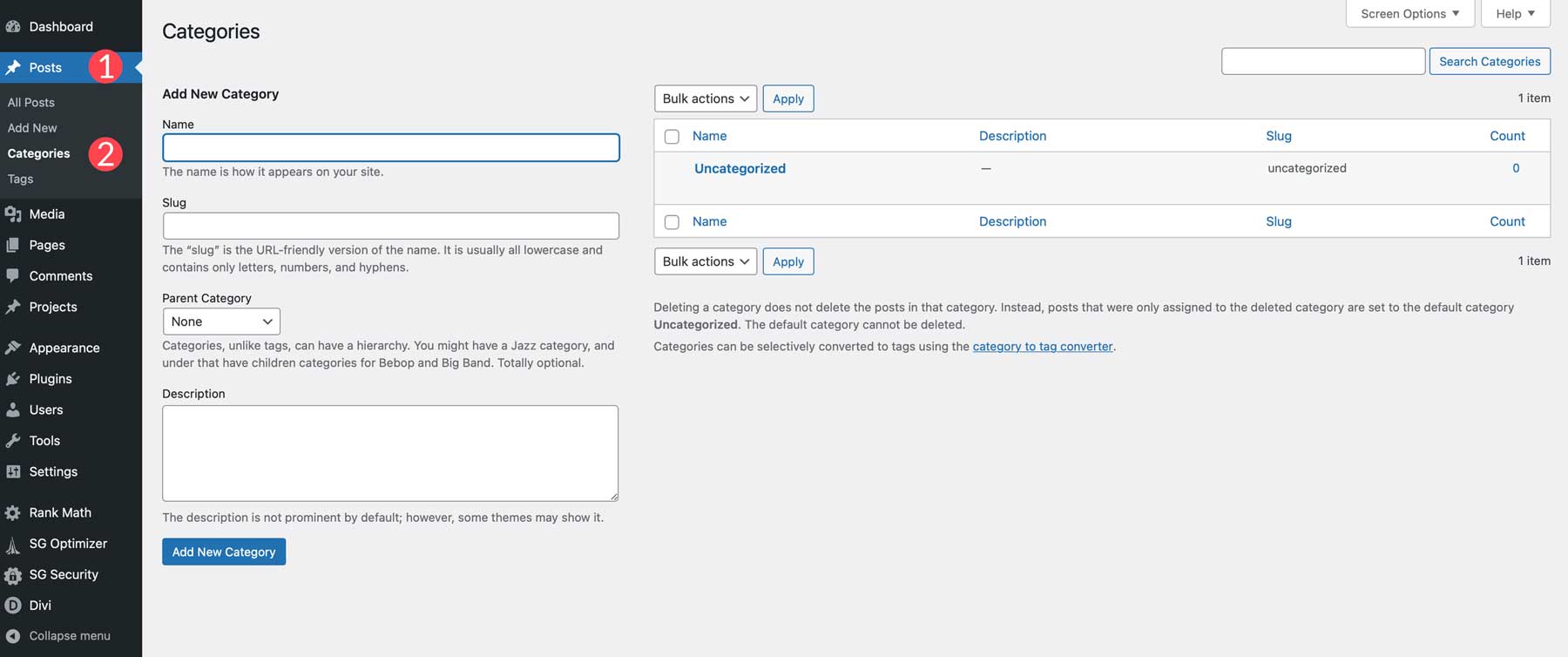
The next step is to give your new category a name, add a description, then click Add New Category.
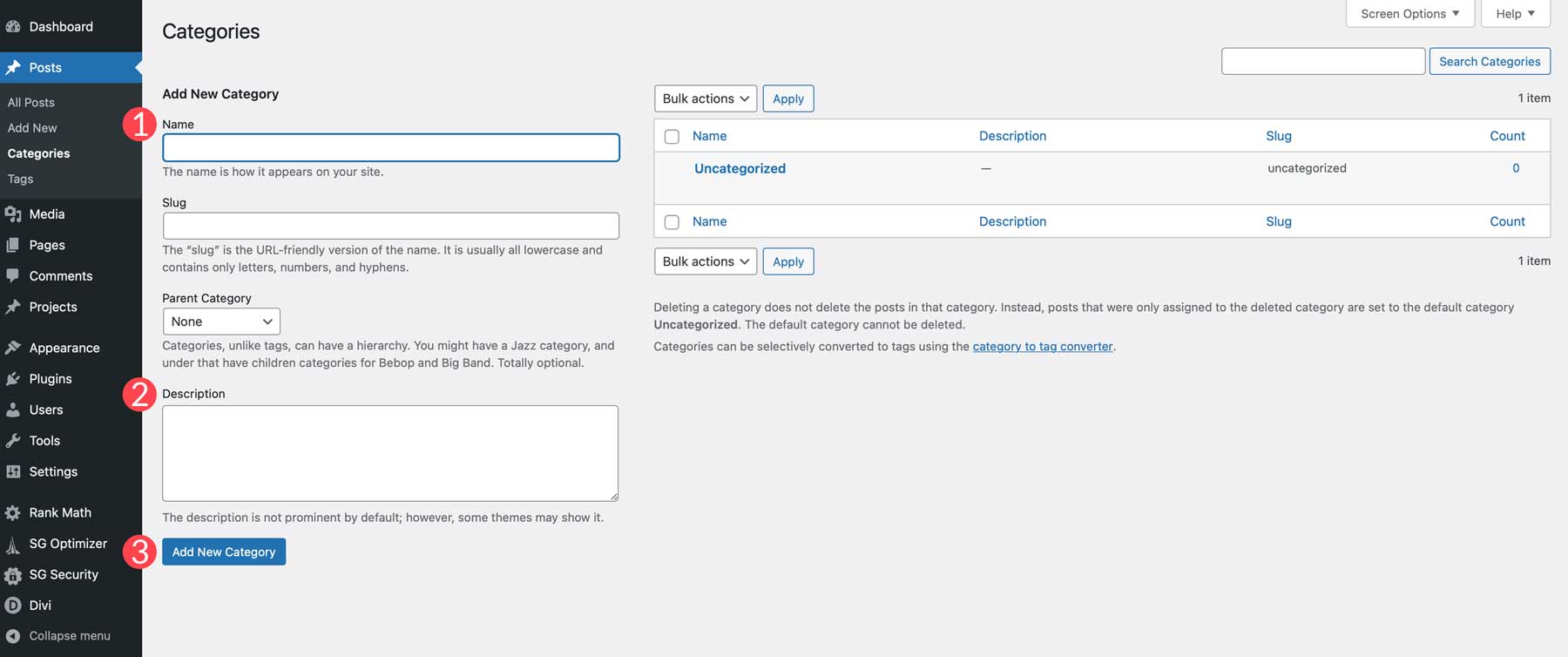
Once you have created a main category, you can create new top-level categories or subcategories by assigning a parent category.
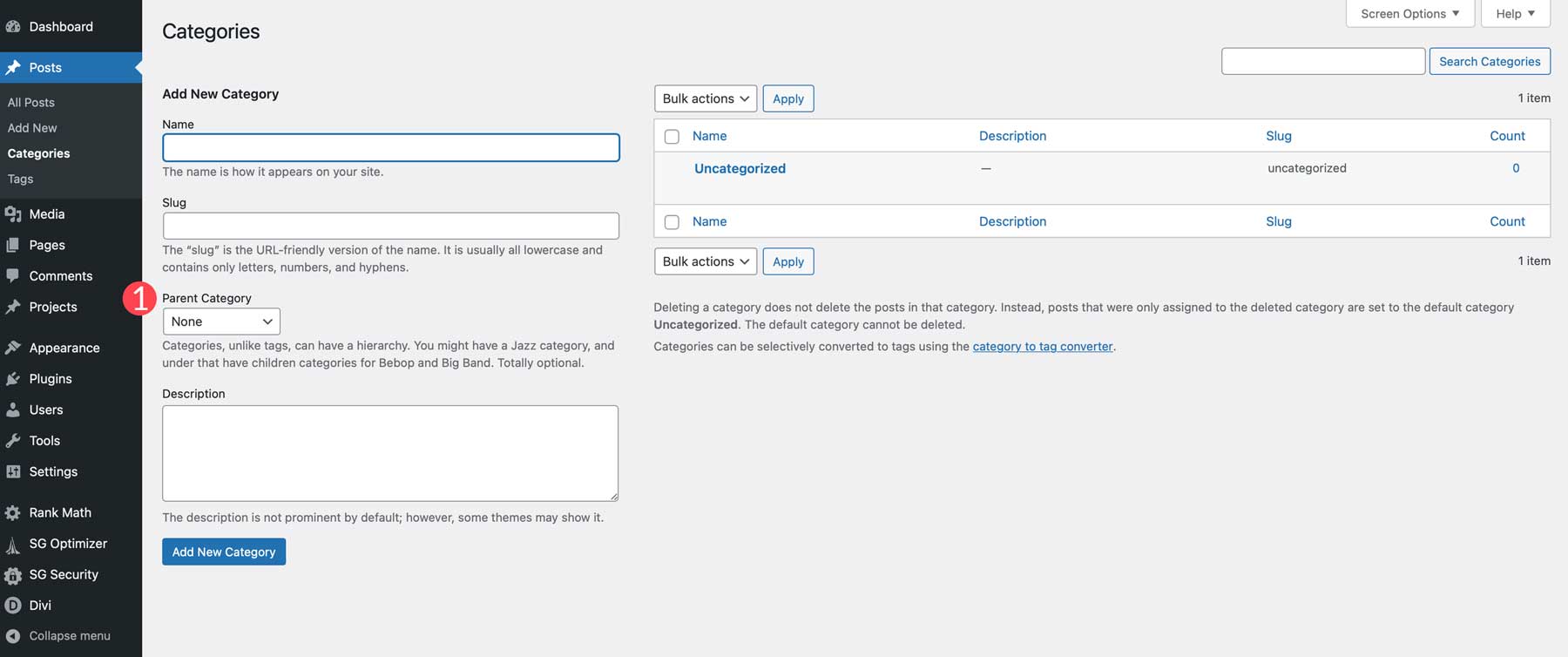
Alternatively, categories can be created on the fly at the post level. To accomplish this, click on Posts > Add New.
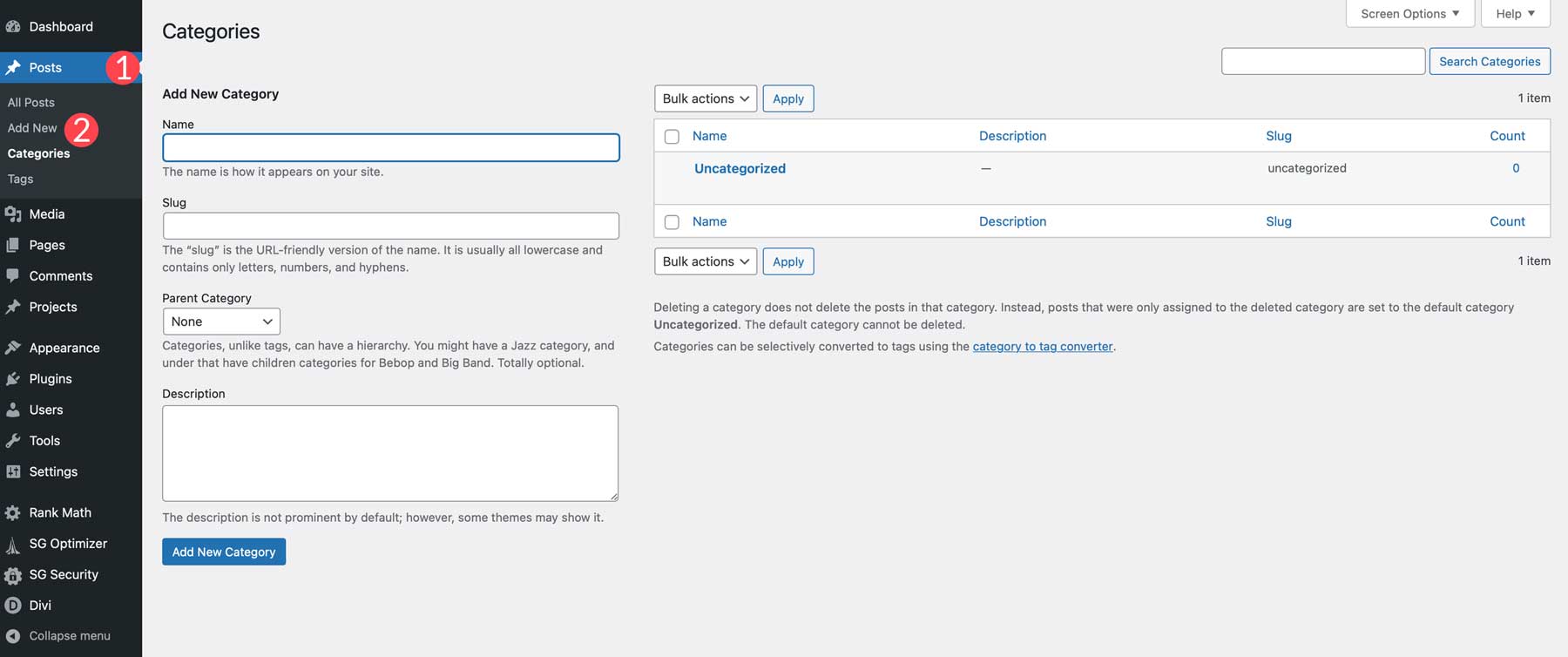
To add a new category at the post level, click the Categories dropdown on the WordPress editor’s right-hand side. Then, click Add New Category.
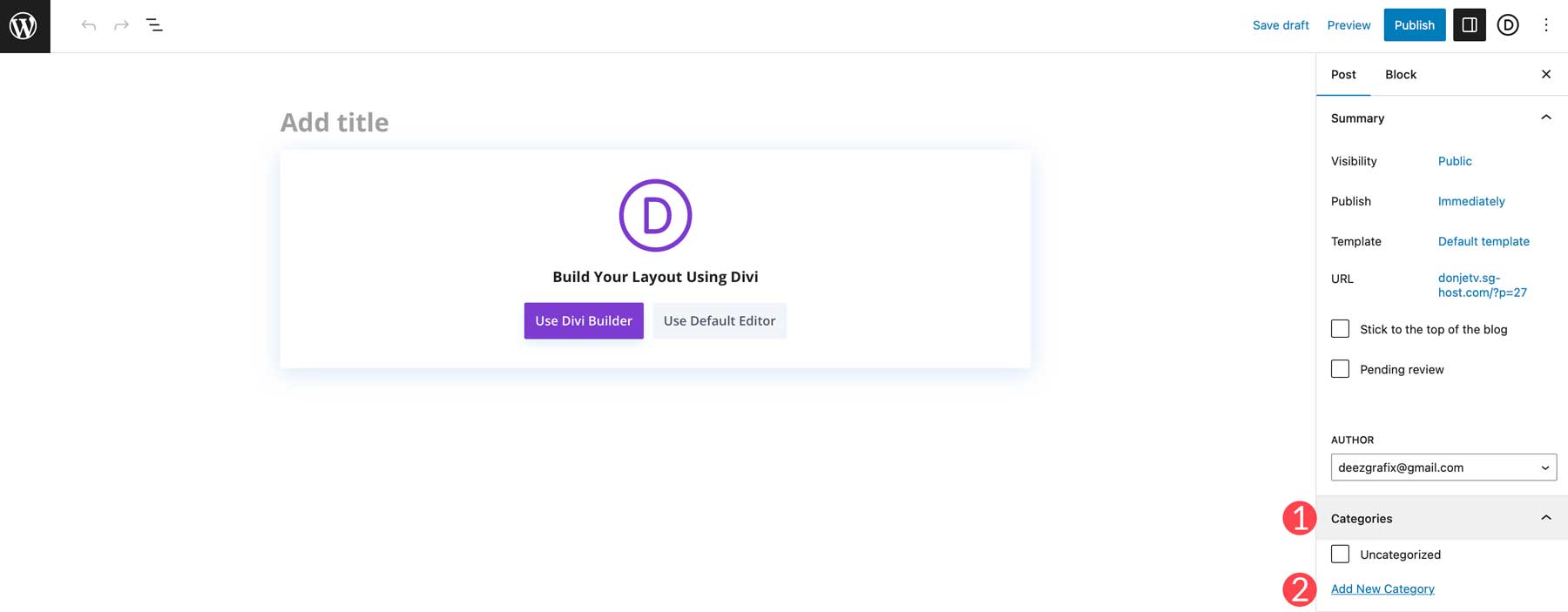
Once you have added all the categories you need, you can showcase your category list on a blog roll page in a sidebar or any other page. As a Divi user, you can even find creative ways to display them in your header or footer by using the Theme Builder.
Create Your Pages
Next, we’ll use Divi to create our first page. To keep things simple, we’ll use one of Divi’s awesome layout packs. First, we’ll create the home page from the Marketing Layout Pack for Divi. Navigate to Pages > Add New in your WordPress dashboard.
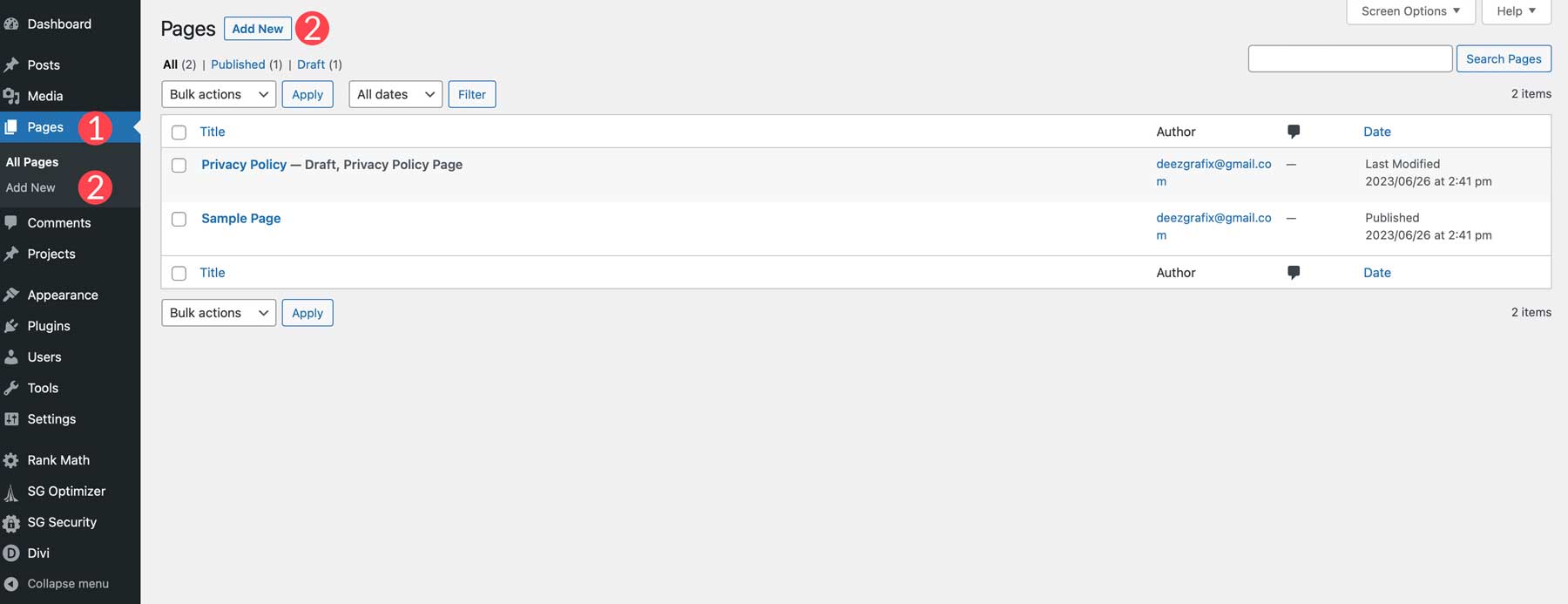
Add Home as the title, then click the Use Divi Builder button.
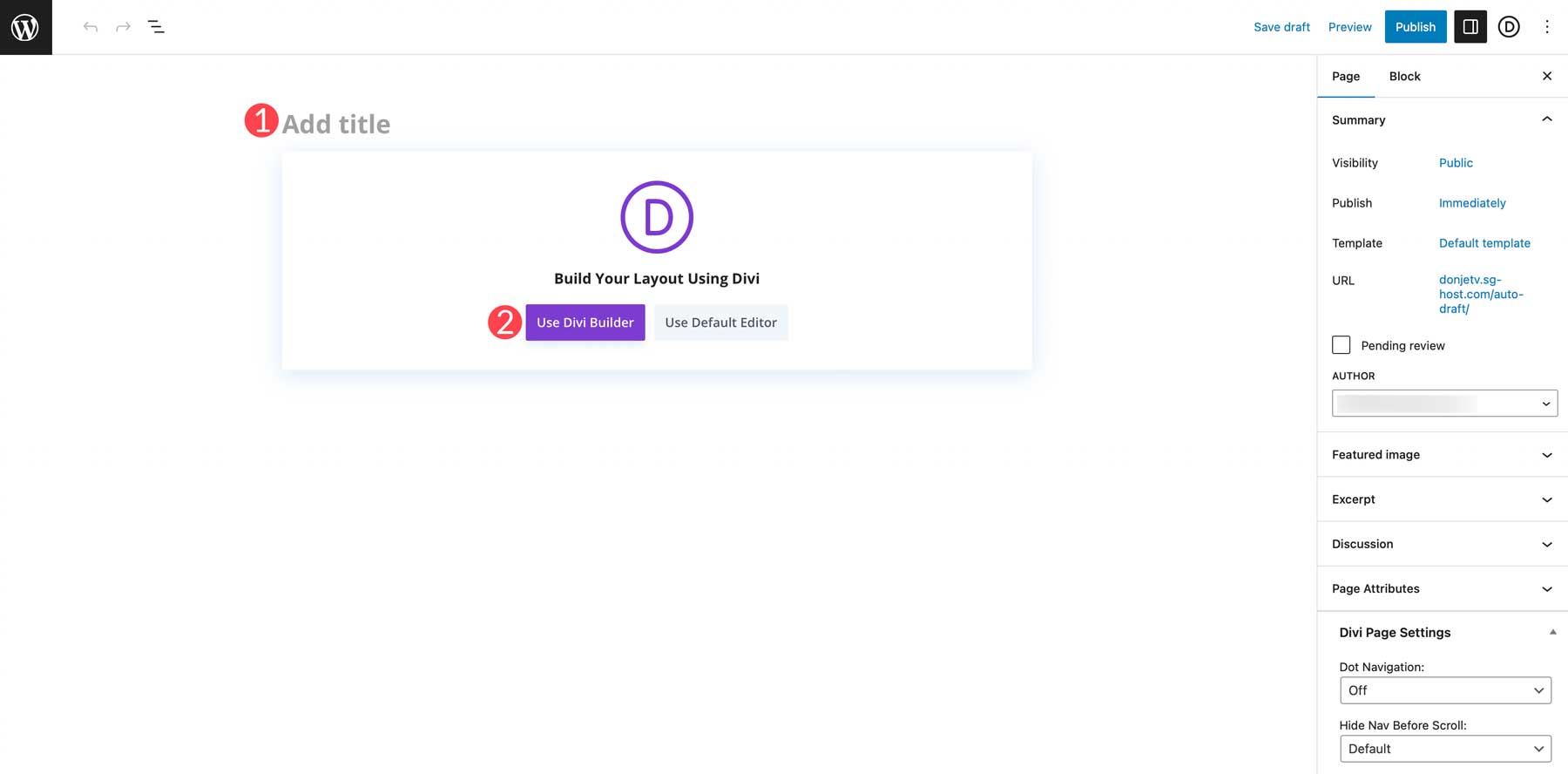
Next, select Browse Layouts.
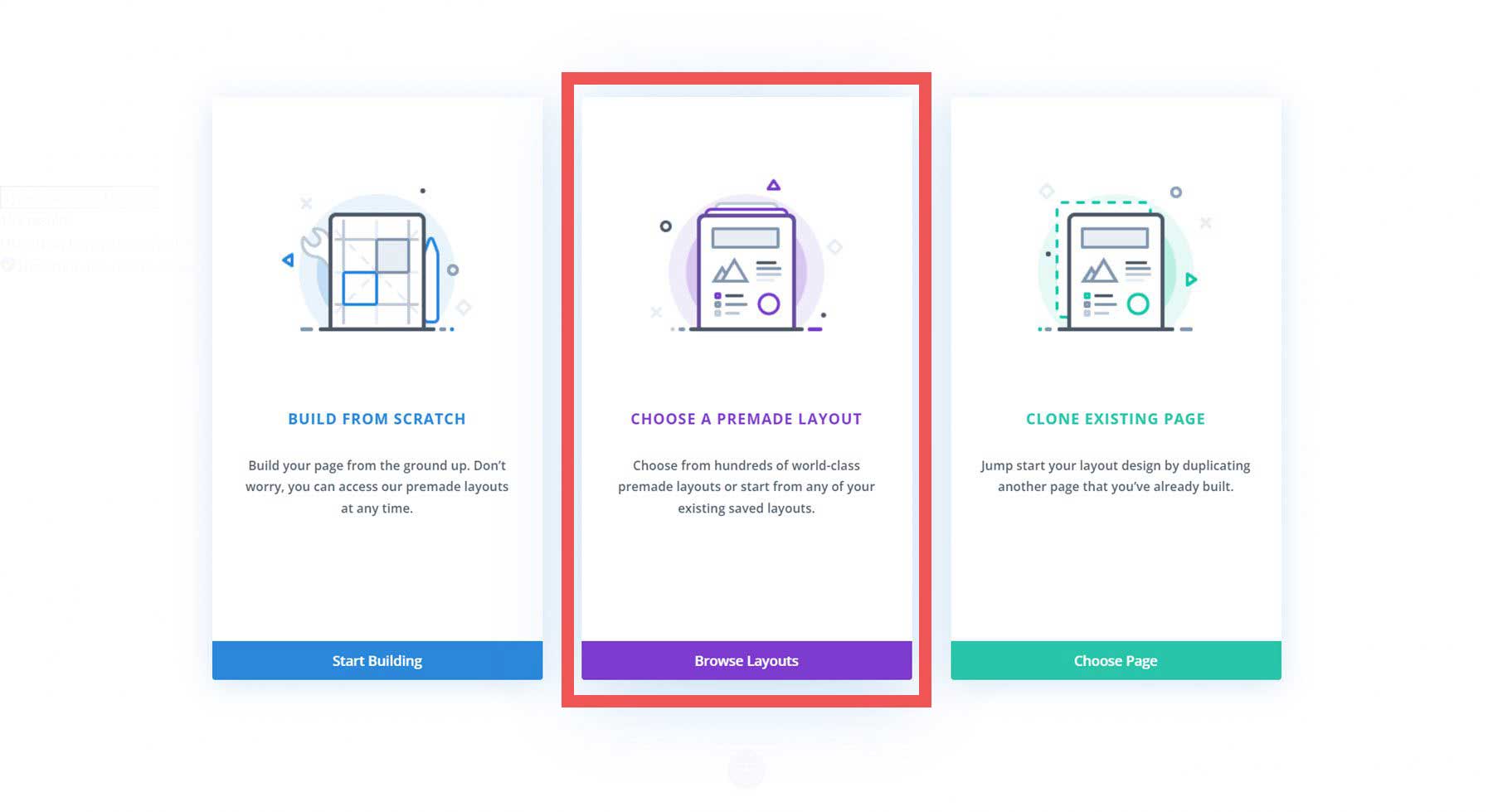
Choose the marketing layout back by clicking on it.
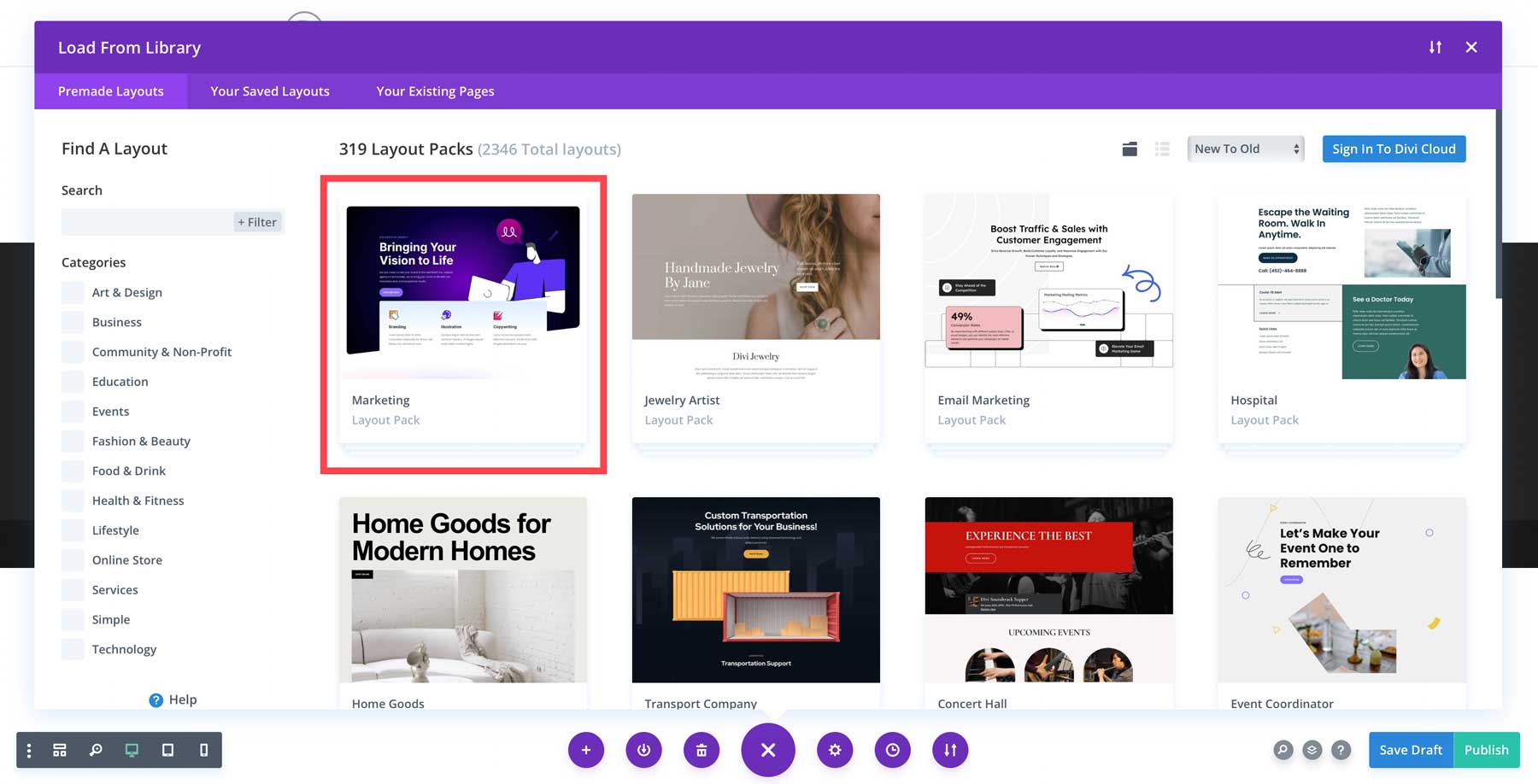
Next, click on the Homepage layout.
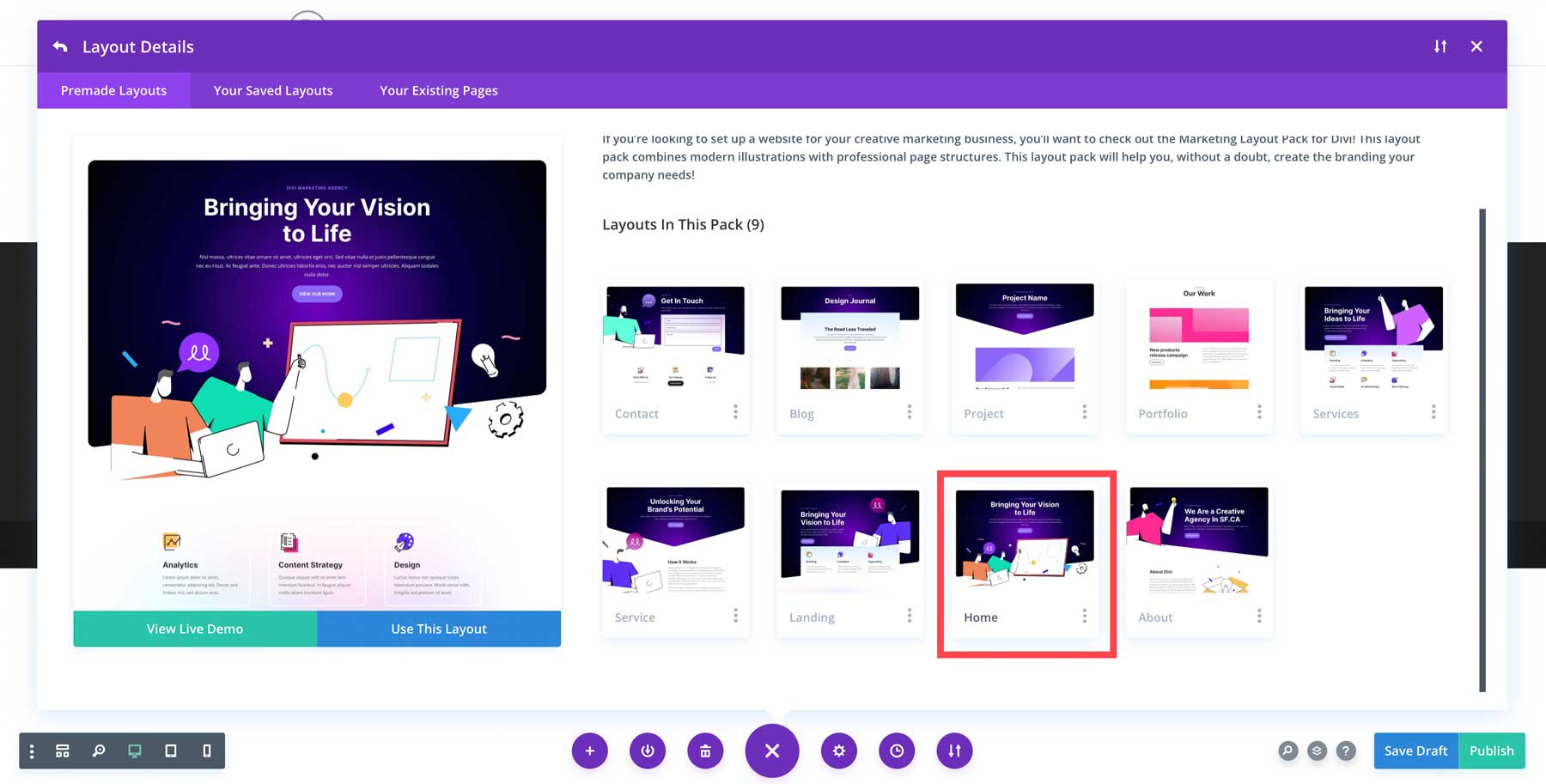
Finally, click the Use This Layout button to insert the design into your page.
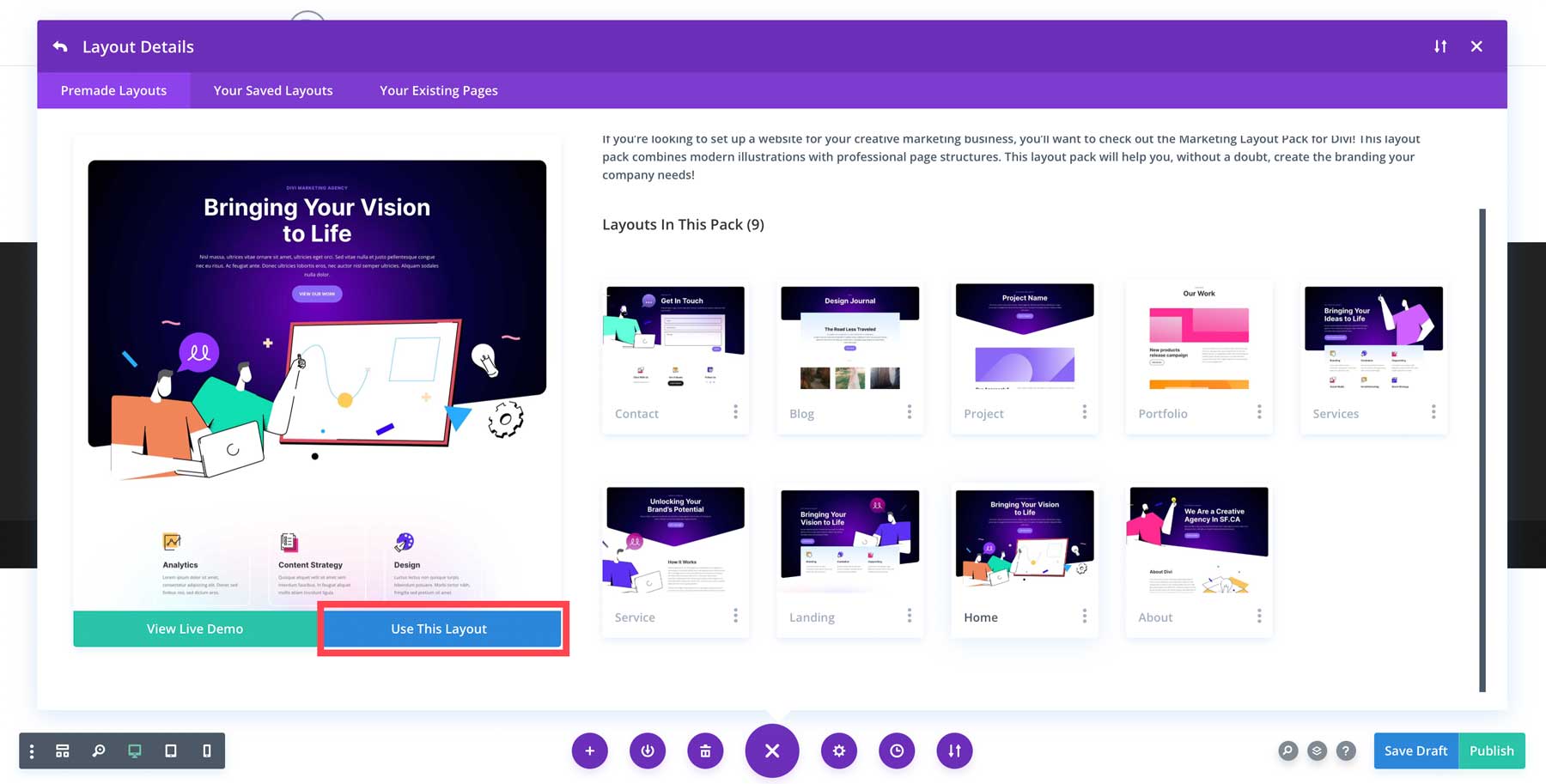
If you’d like to import the presets of the layout pack, be sure to check Import Presets, then click the Import button.
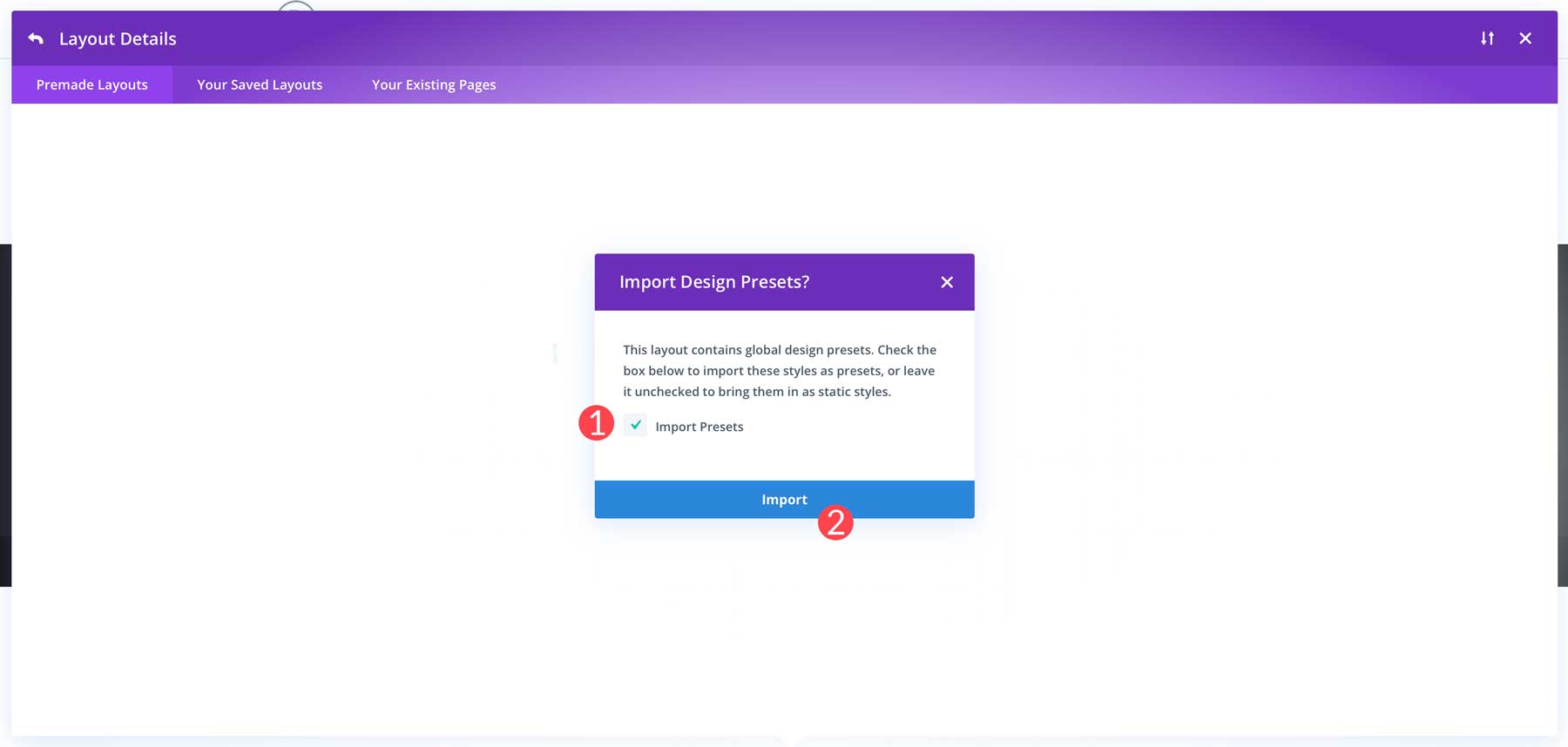
Once the page reloads, you can edit the text and images in the layout’s modules by hovering over the module you’d like to edit, then clicking the gear icon to bring up the module’s contents.
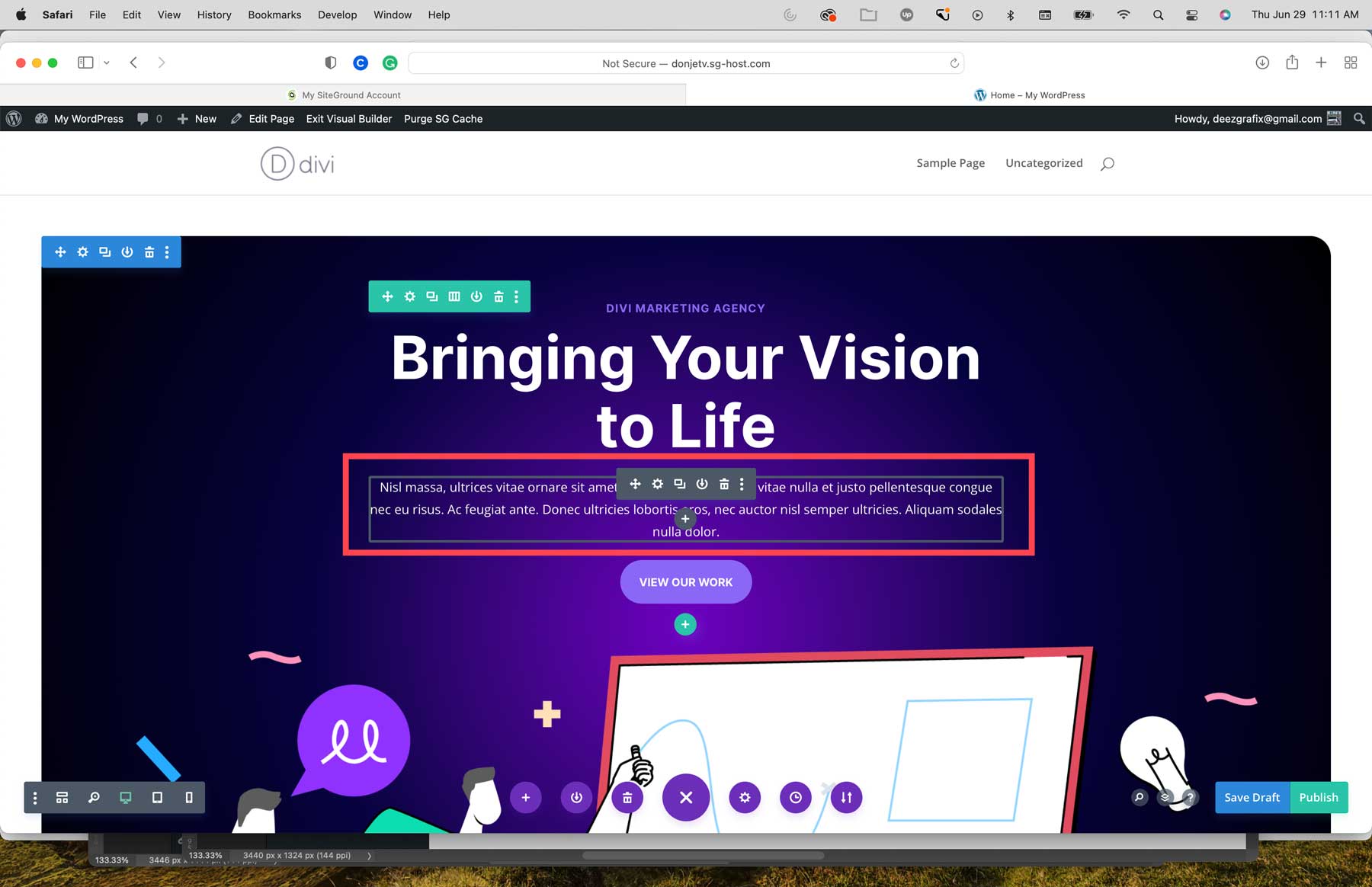
Make your edits by replacing the placeholder content in text modules.
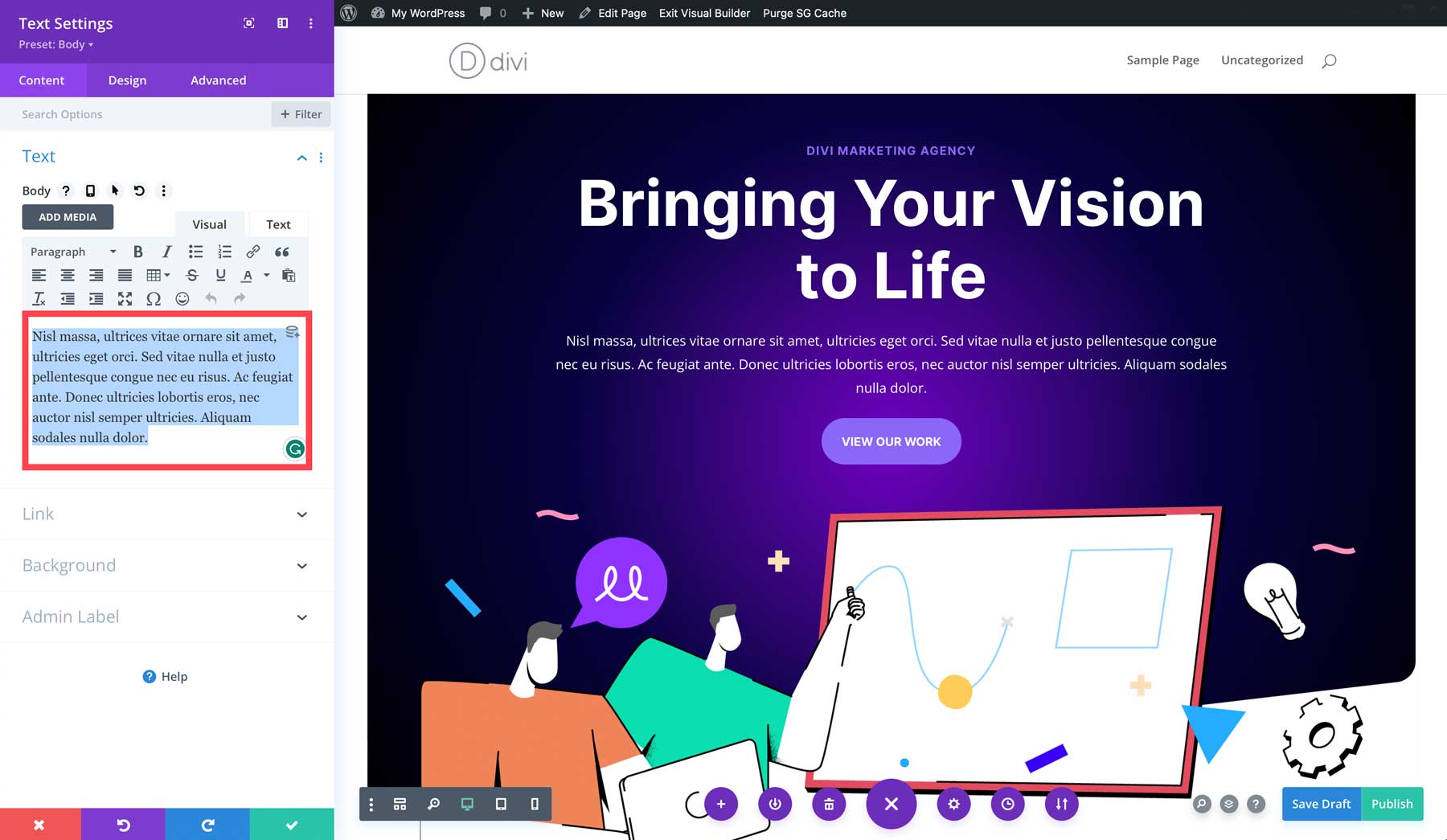
Once you’ve completed the editing process, save your draft or publish the page by clicking the corresponding button in the lower right-hand screen of the Visual Builder.
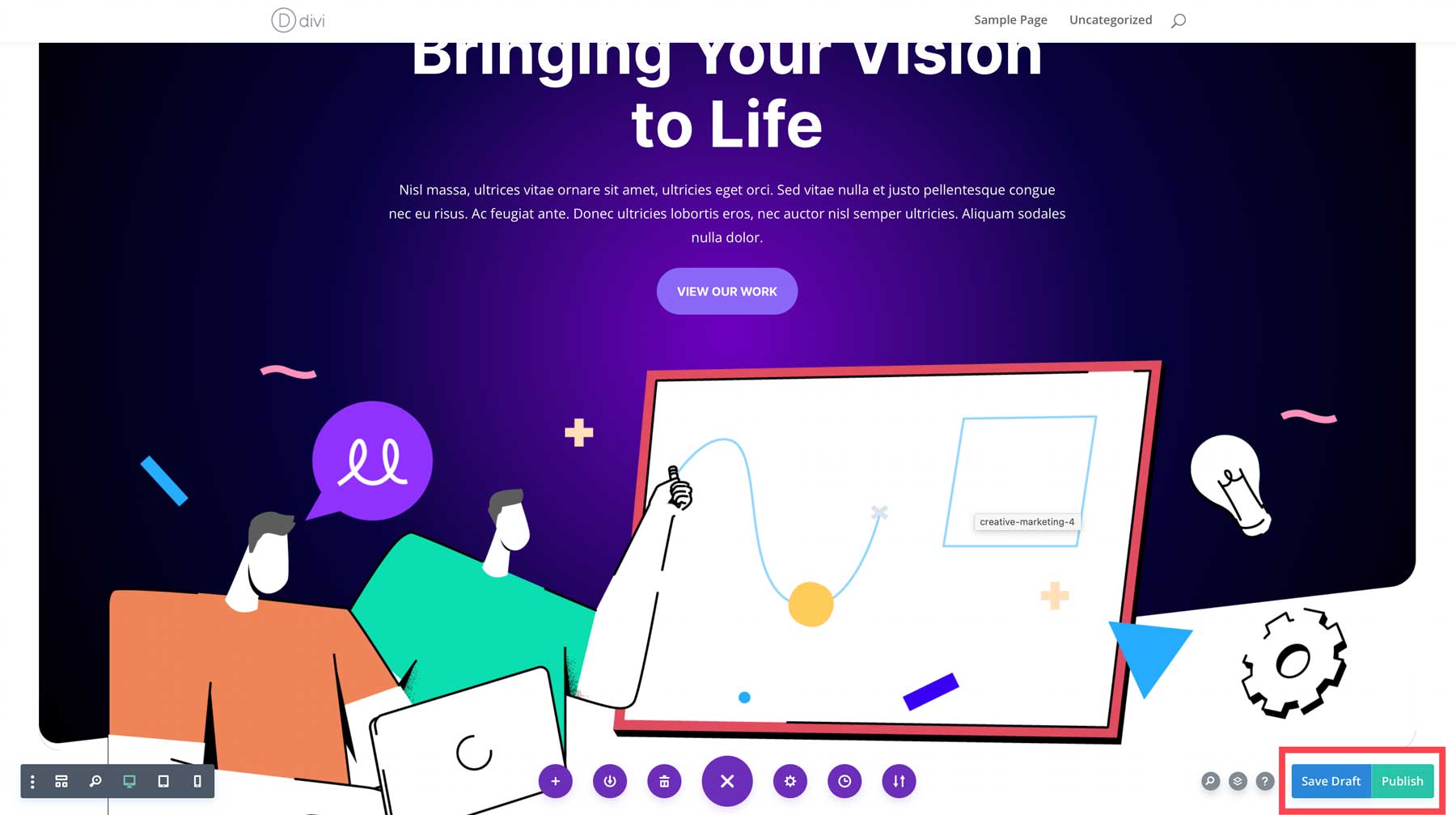
Create Your Templates
As previously mentioned, Divi’s Theme Builder allows you to create custom templates for every section of your website. Design custom headers and footers, blog post layouts, category and tag page templates, and more.
The default website template (1) is the section you’d use to create a global header, body, and footer. This allows you to create any layout to feature your blog’s navigation. To create new templates, you’ll click the Add New Template button (2). If you want to use a premade theme builder set, click the + icon (3). To save your templates, click the save button (4). The remaining icons allow you to delete (5), view your design history (6), and import or export your layouts (7).
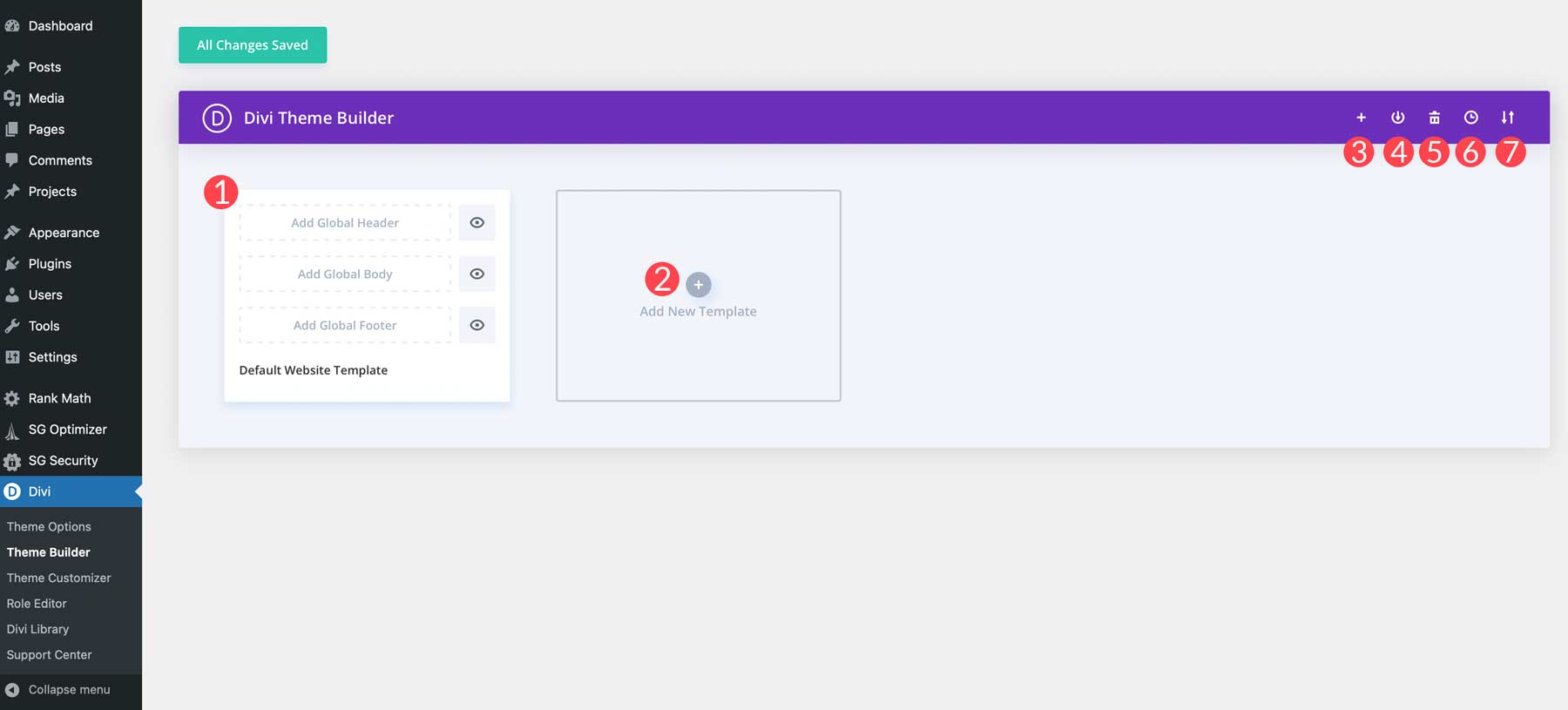
As you begin creating templates for your website, you’ll notice that multiple templates can get messy. So, take steps to organize them so they are easier to find.
Ok, on to creating your first template. Start by navigating to Divi > Theme Builder.
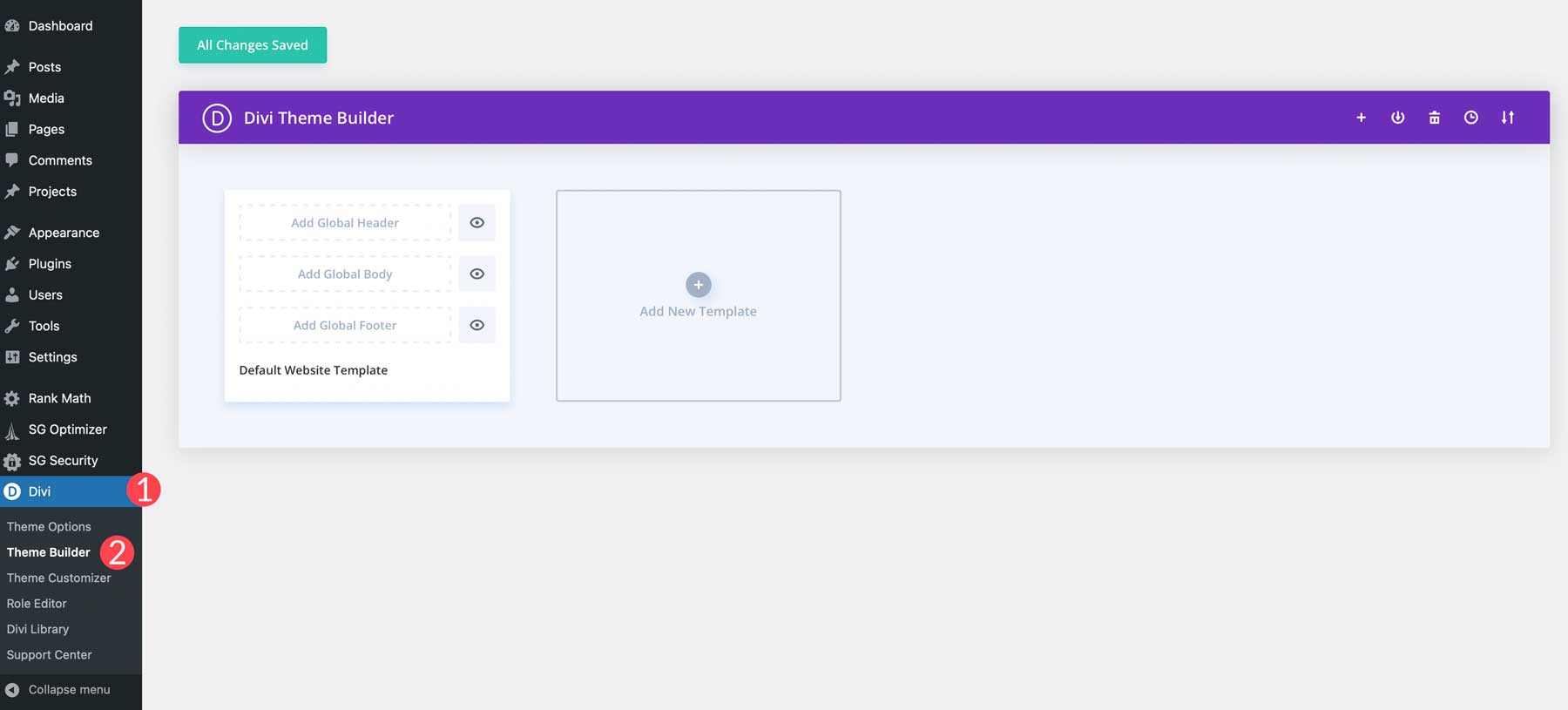
As noted, you’ll click the Add New Template button to create a template. Select Build New Template from the popup.
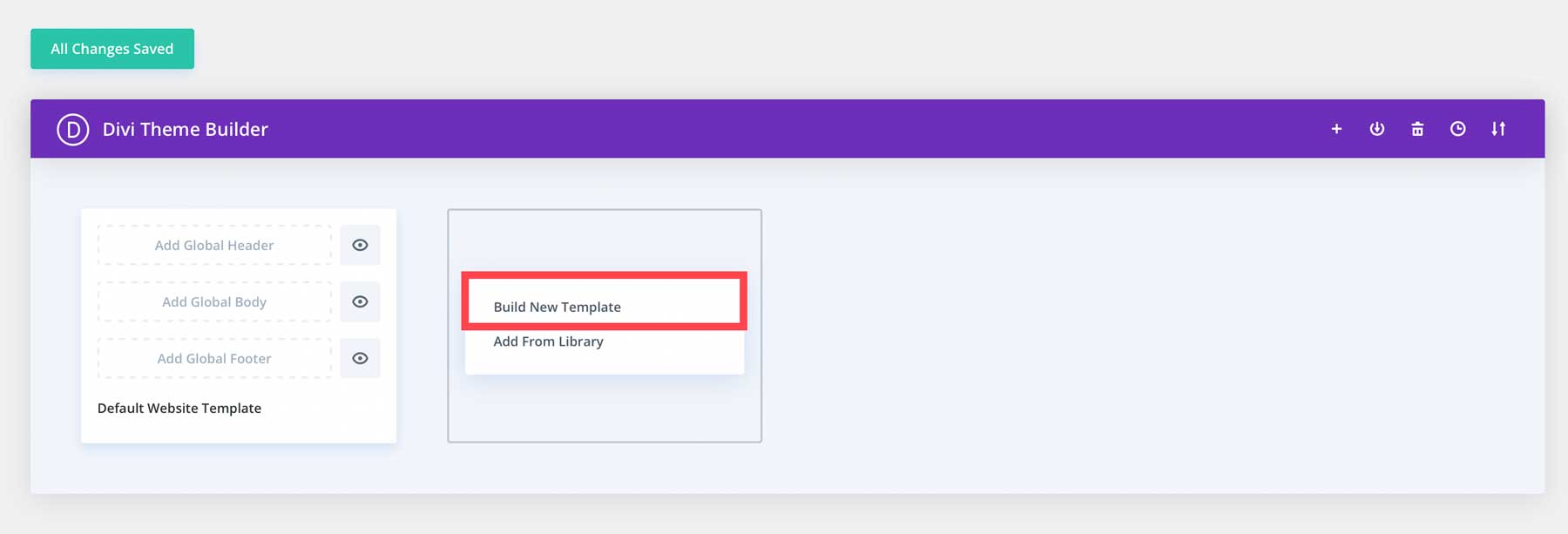
Next, tick All Posts, then click the Create template button. These selections will allow you to create a template for posts which will be applied to every post you write.
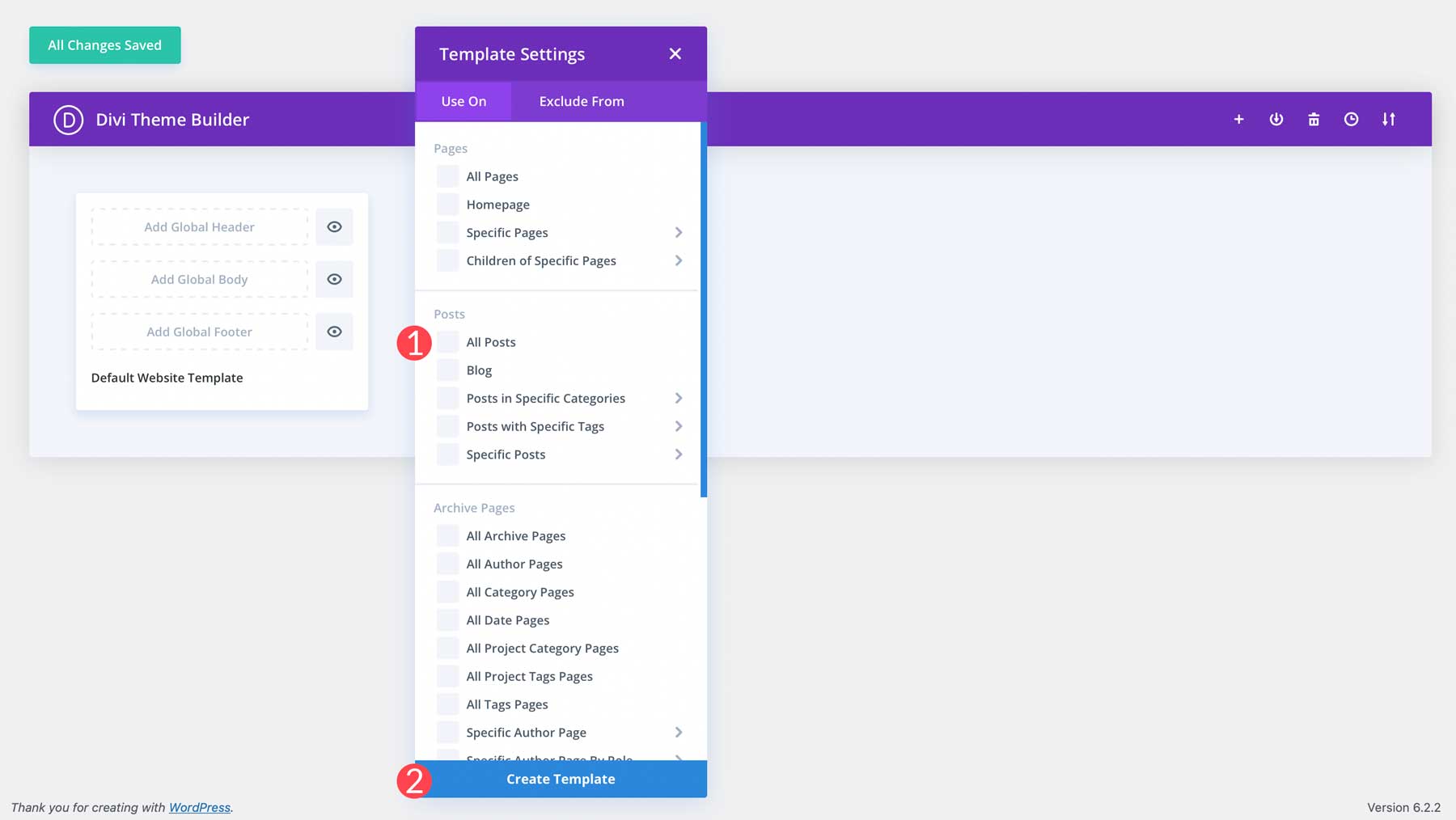
Next, click Add Custom Body in the All Posts template. Click Build Custom Body when the popup appears.
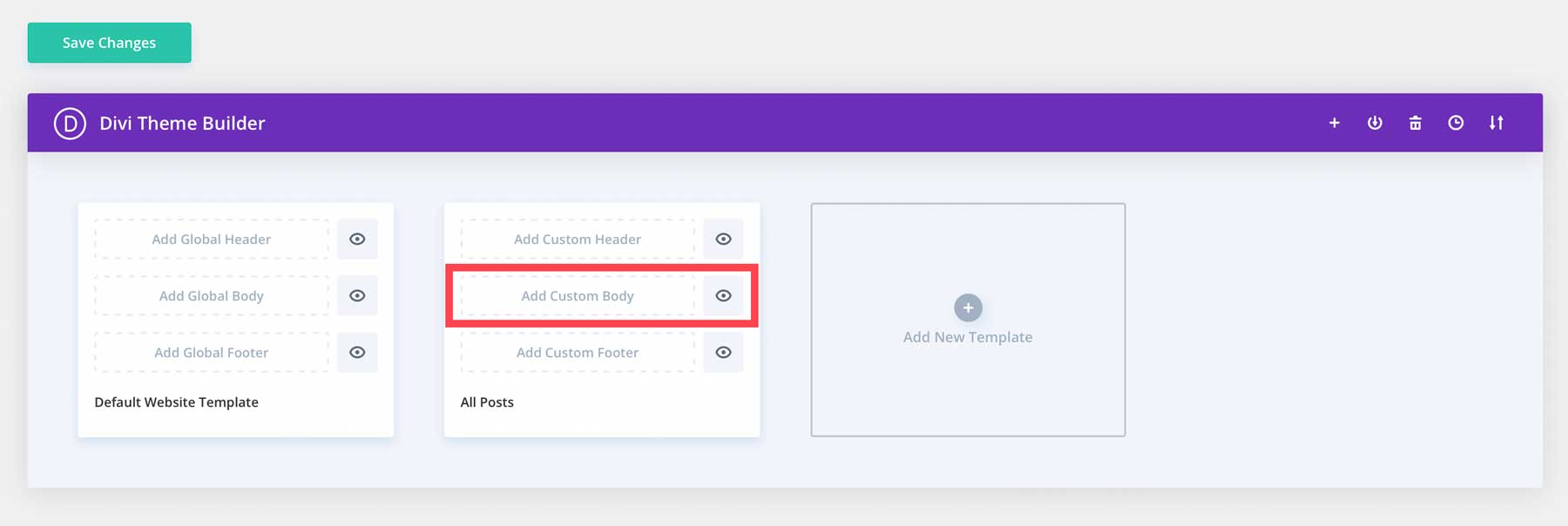
From there, you can use the Visual Builder to design a blog post template to match your site’s design.
6. Create a Content Strategy
Now that your pages and blog post template are created, you can concentrate on forming a content marketing strategy. It involves creating content that is specifically related to your niche. Strategizing your content can help you get your business noticed, build a good reputation, and boost your SEO. You’ll be best served by analyzing your competition, learning about your potential audience, and conducting keyword research.
7. Write Your First Post
When the time comes to write your first post, the most important thing is to focus on writing quality content. Be sure to keep your target audience in mind so that you’re delivering content that aligns with their interests. Start by organizing your thoughts, creating a blog post outline, and structuring your post to maximize your reader’s attention. Remember, writing your first post sets the tone for your blog, so take your time and make it a captivating and valuable piece that leaves a positive impression on your readers.
When writing in WordPress and Divi, there are a couple of ways to create your post, either in the Visual Builder, classic editor, or the Gutenberg editor. Since we created a template for our blog posts, the easiest route is using Gutenberg. It functions much like the word processors of the past, allowing you to directly type text, or use blocks to add other content.
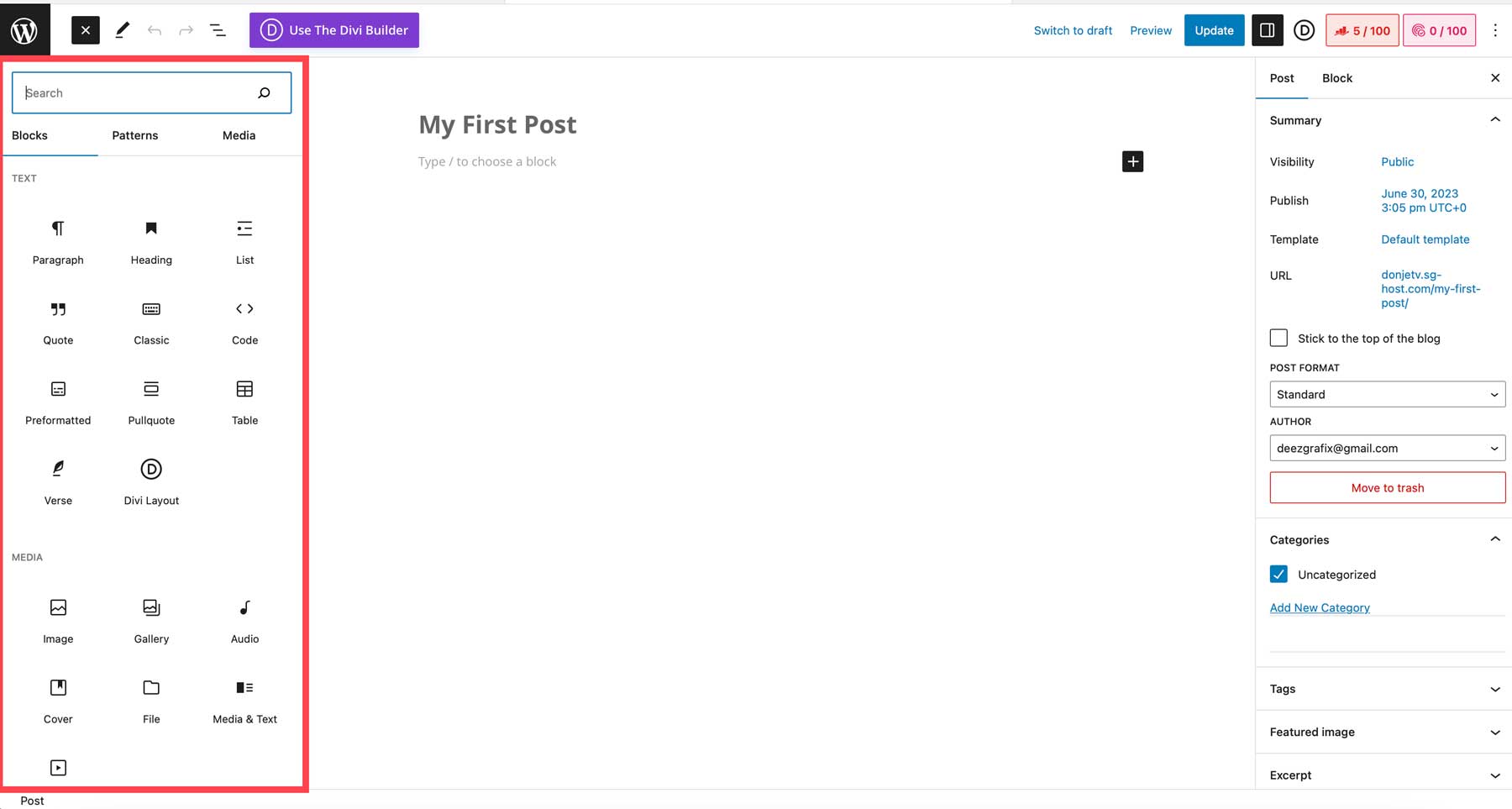
If you find yourself suffering from writer’s block or need a little help crafting a good headline or outline for your post, consider incorporating a good AI writing software to help jumpstart your creativity.
Once you’ve added all of your content, you can easily make your post live by clicking the Publish button.
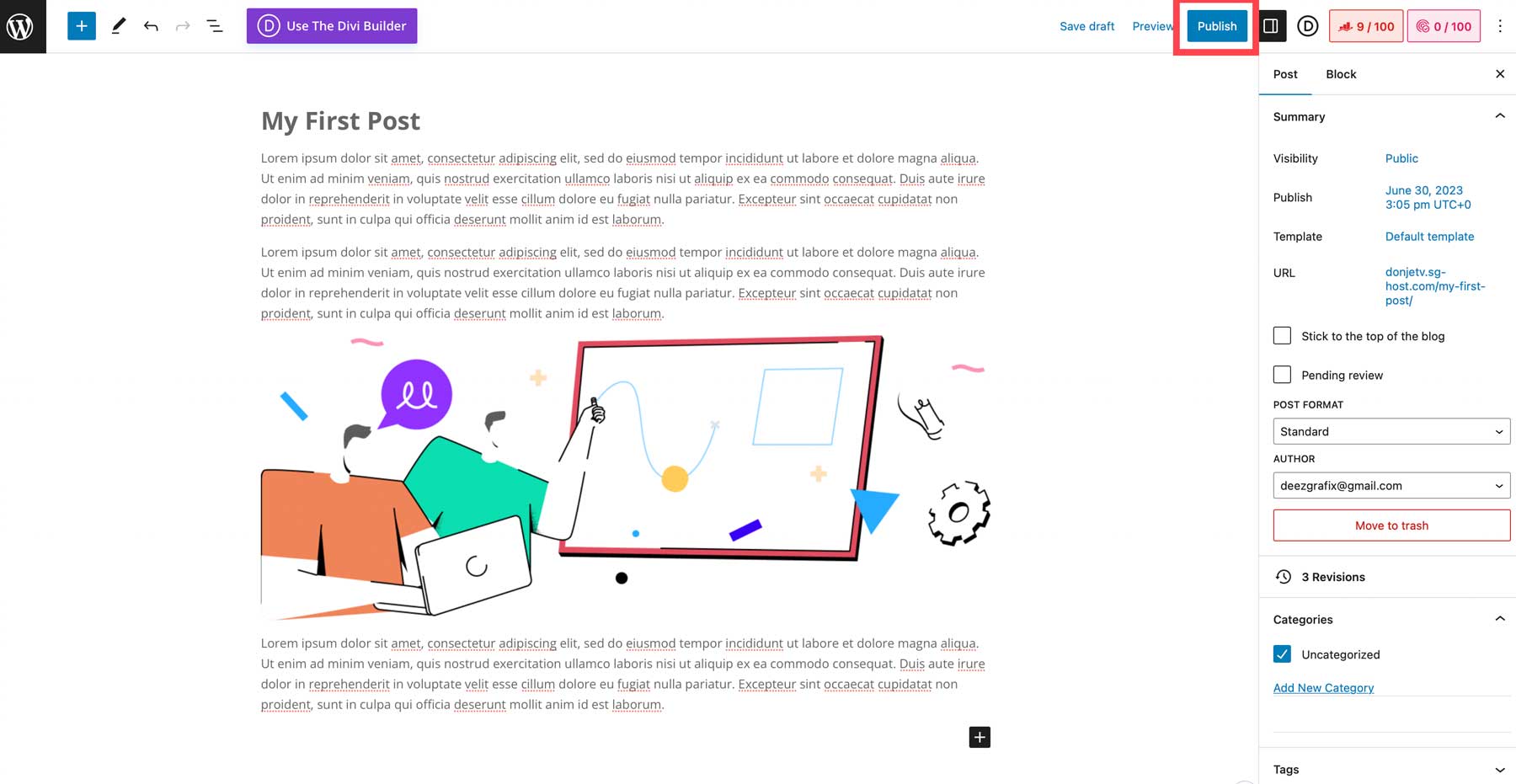
8. Optimize Content for SEO
You can write the best content in the world, but you’re missing the mark if you aren’t optimizing for SEO. To optimize your content, start by using a good keyword strategically throughout your post, avoiding keyword stuffing. It’s also important to add alt tags to your images, ensure that you’re using headlines properly, and keep your paragraphs concise, yet engaging.
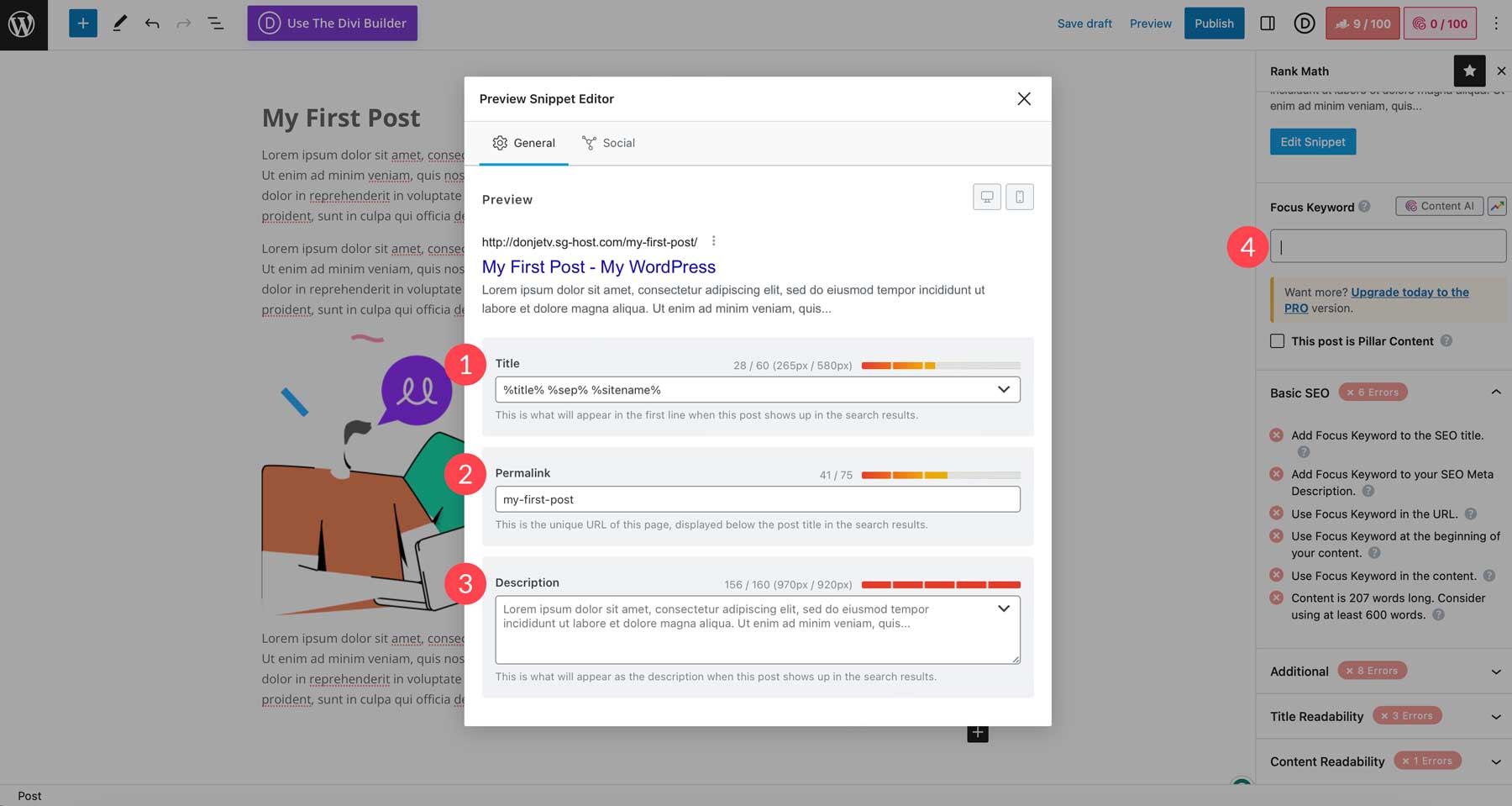
Additionally, pay close attention to on-page SEO elements such as titles, permalinks, and meta descriptions, as they contribute to search engine visibility. Finally, ensure that you’re focusing on mobile SEO, considering more than half of all internet users utilize a smartphone to navigate the internet.
To help you keep a handle on things, consider incorporating a good SEO tool, such as SEMRush, in addition to your chosen SEO plugin.
9. Use an Editorial Calendar to Post Content Consistently
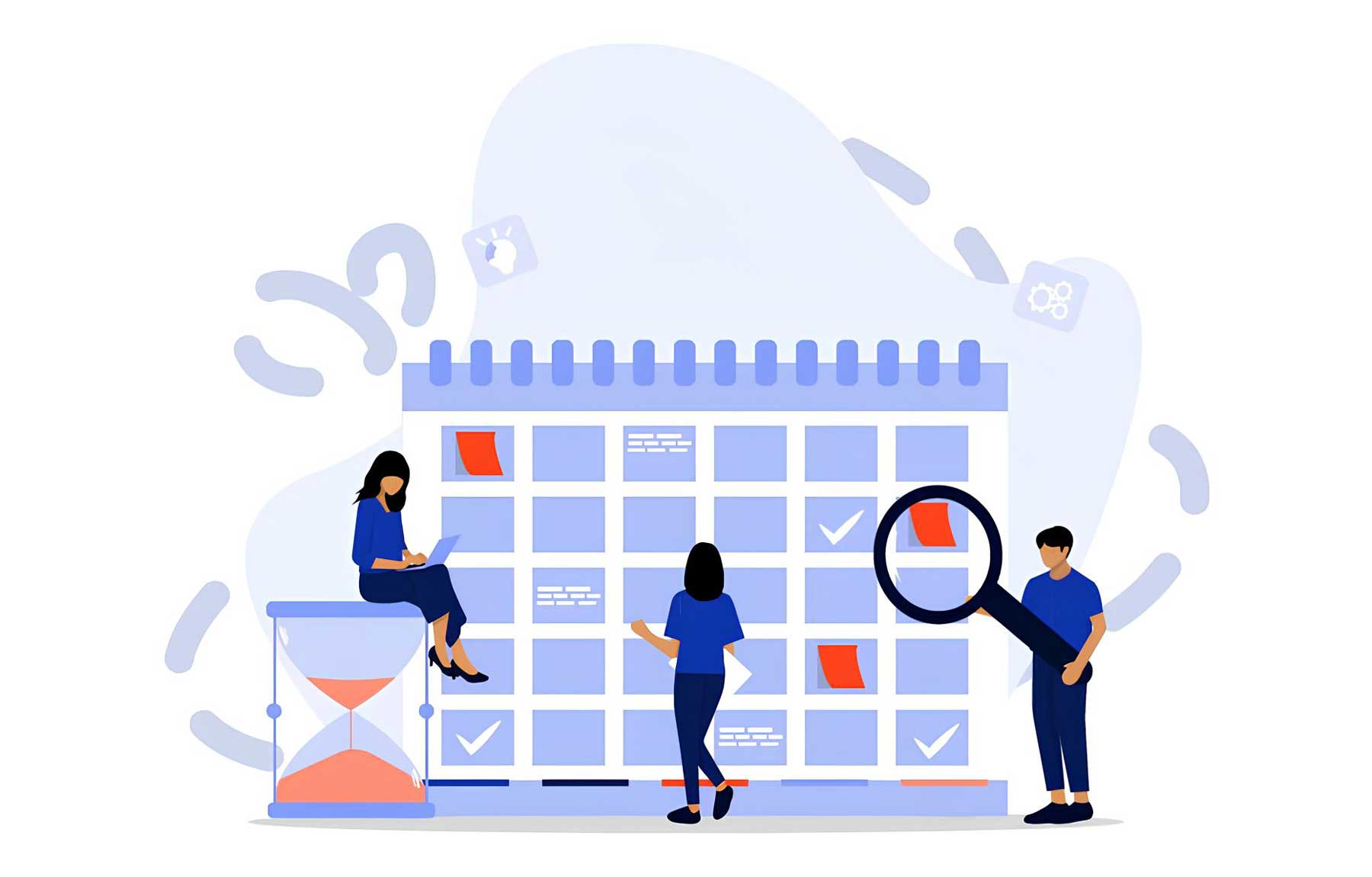
Next, you’ll want to plan how often you release new posts. Set a regular posting schedule that works for you and your target audience, whether weekly, bi-weekly, or monthly. A good editorial calendar plugin helps you plan how often to release new content and helps to keep track of your goals. By establishing a good routine, you create expectations for your readers to keep them coming back for more.
10. Monetize Your Blog
Once you have established a solid foundation and built your audience, you can take steps to generate income with your new blog. One popular method is through native advertising, where you can display ads or sponsored posts anywhere on your blog to earn revenue based on clicks or impressions.
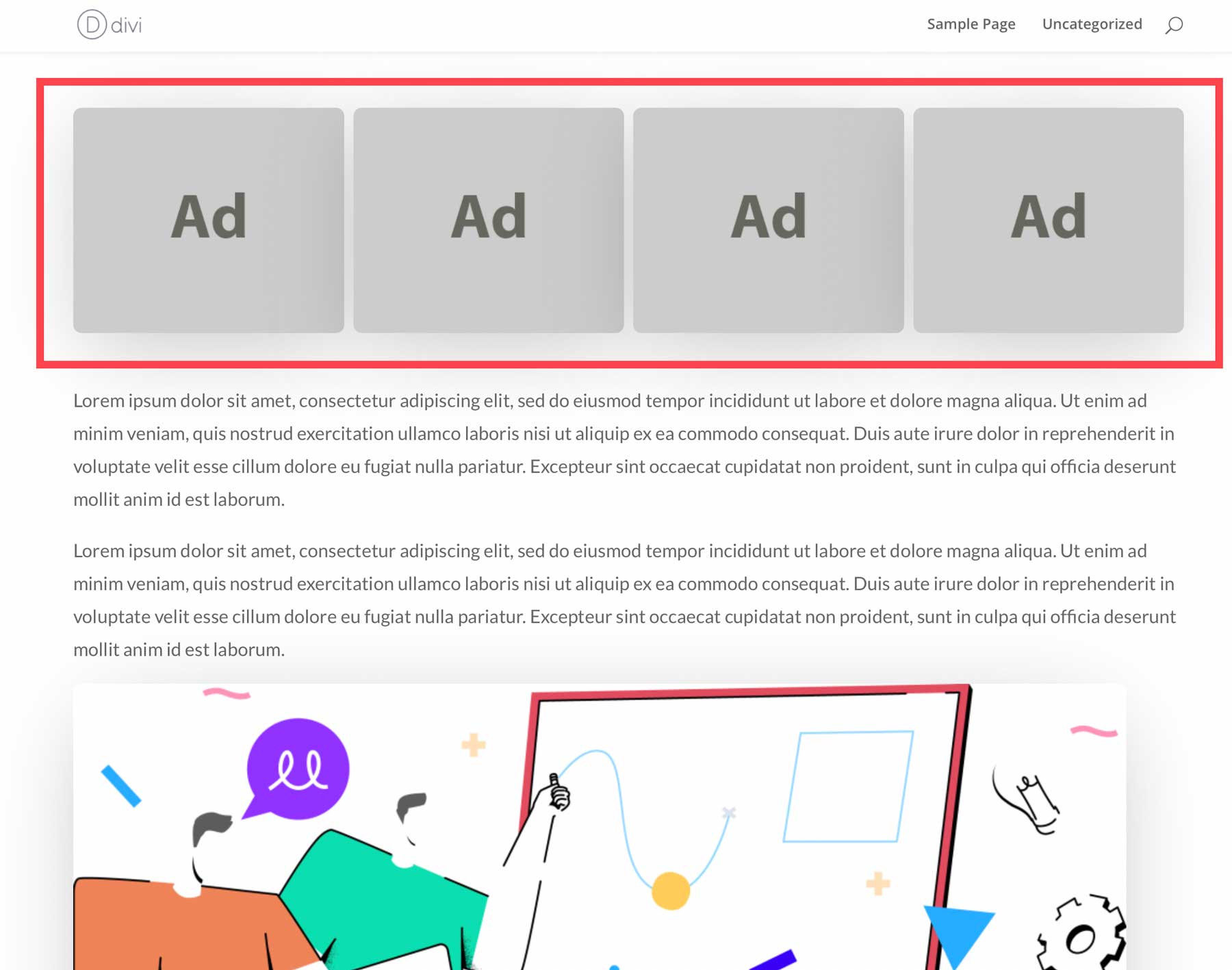
Another option is affiliate linking, where you promote products or services to earn a commission for every sale. Remember that choosing affiliate partnerships that align with your niche is important to provide value to your audience.
You’ll also want to incorporate a good affiliate marketing plugin to help disguise ugly links, gain access to reporting, or offer discounts on purchased products.
Final Thoughts on How to Start a Blog
Starting a successful blog requires careful planning, dedication, and consistent effort. By following our step-by-step process, you can establish a strong foundation for your blog and increase your chances of success. It begins with setting a clear goal and identifying a niche that truly resonates with your audience. As you progress, partnering with a reputable host like SiteGround provides a reliable platform for your blog to thrive. Remember the importance of optimizing your blog for search engine optimization (SEO) to ensure maximum visibility. Let’s not forget about the exciting prospect of income-generating opportunities that can put some cash in your pocket.
Are you looking for more tutorials? Check out a few Divi-related how-to’s to kick your new blog into high gear:
- Divi Speed Optimization: the Ultimate Guide
- Gutenberg and the New Divi Builder Experience
- Introducing Over 70 Brand New Divi Video Tutorials For You And Your Clients
Frequently Asked Questions (FAQs)
Before we wrap up, let’s answer some of your most common questions regarding how to start a successful blog. Did we miss one? Leave a question below, and we will respond!
How do you start a blog?
How do I make my blog successful?
Why should I use WordPress to blog?
What are the factors to consider when choosing a name for my blog?
How do I come up with topics to write about?
What skills are needed to become a successful blogger?
Is WordPress better than Blogger?
How can I make money blogging?
How can I make my blog popular?
Where should I host my blog?
What are the top WordPress plugins for bloggers?
What’s the best WordPress theme for blogging?
Featured Image via Fonstra / Shutterstock.com

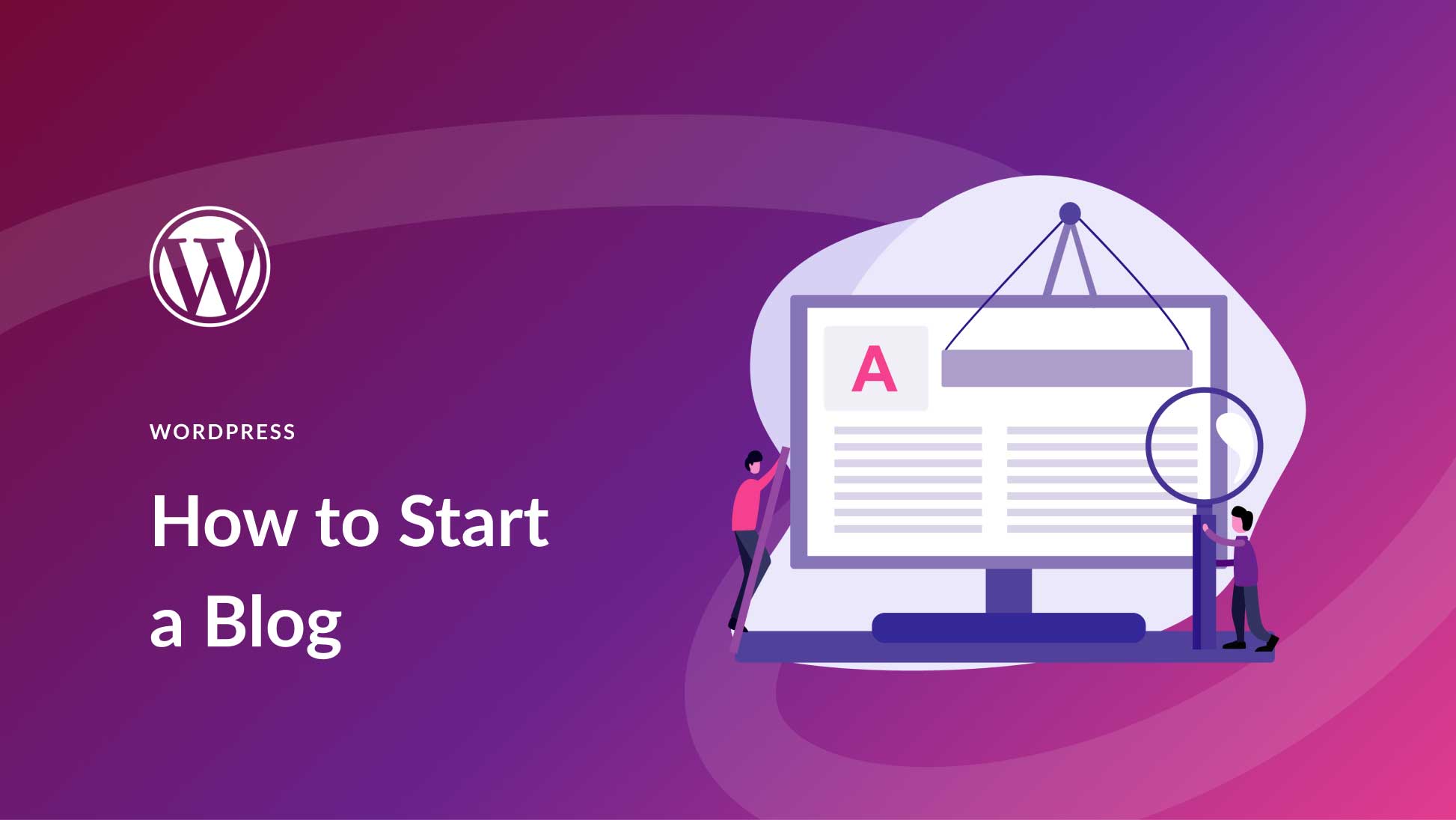



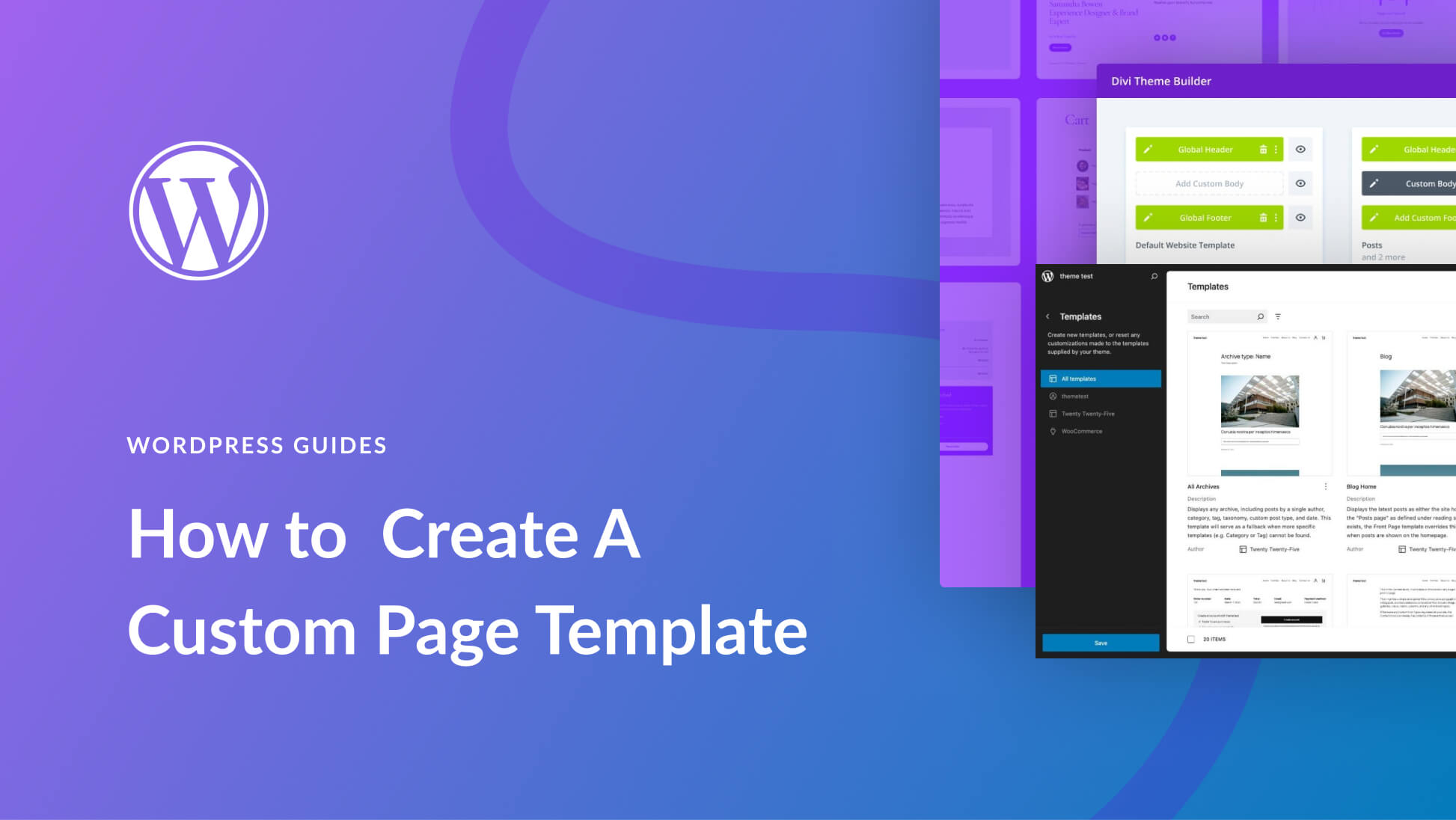
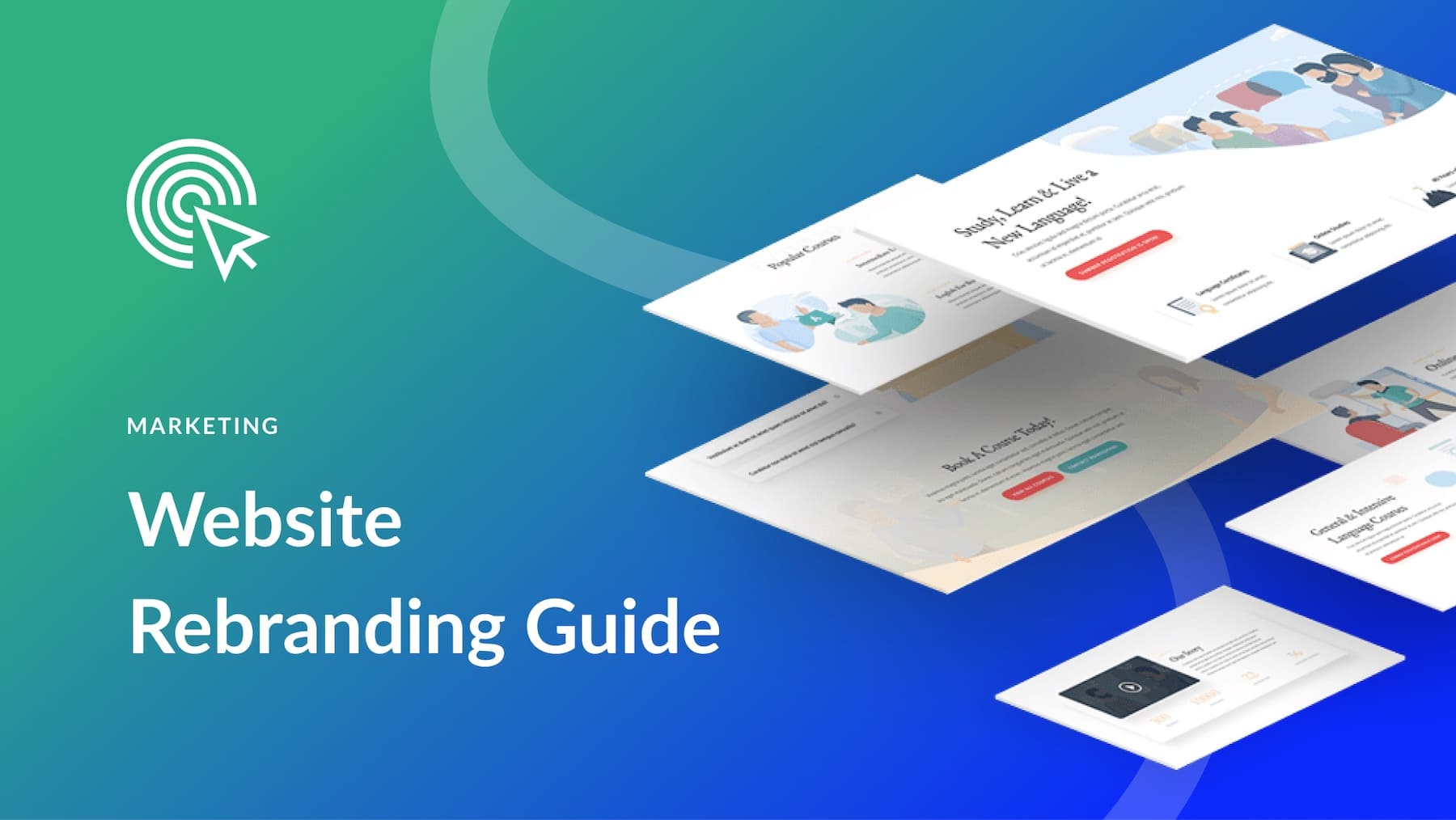
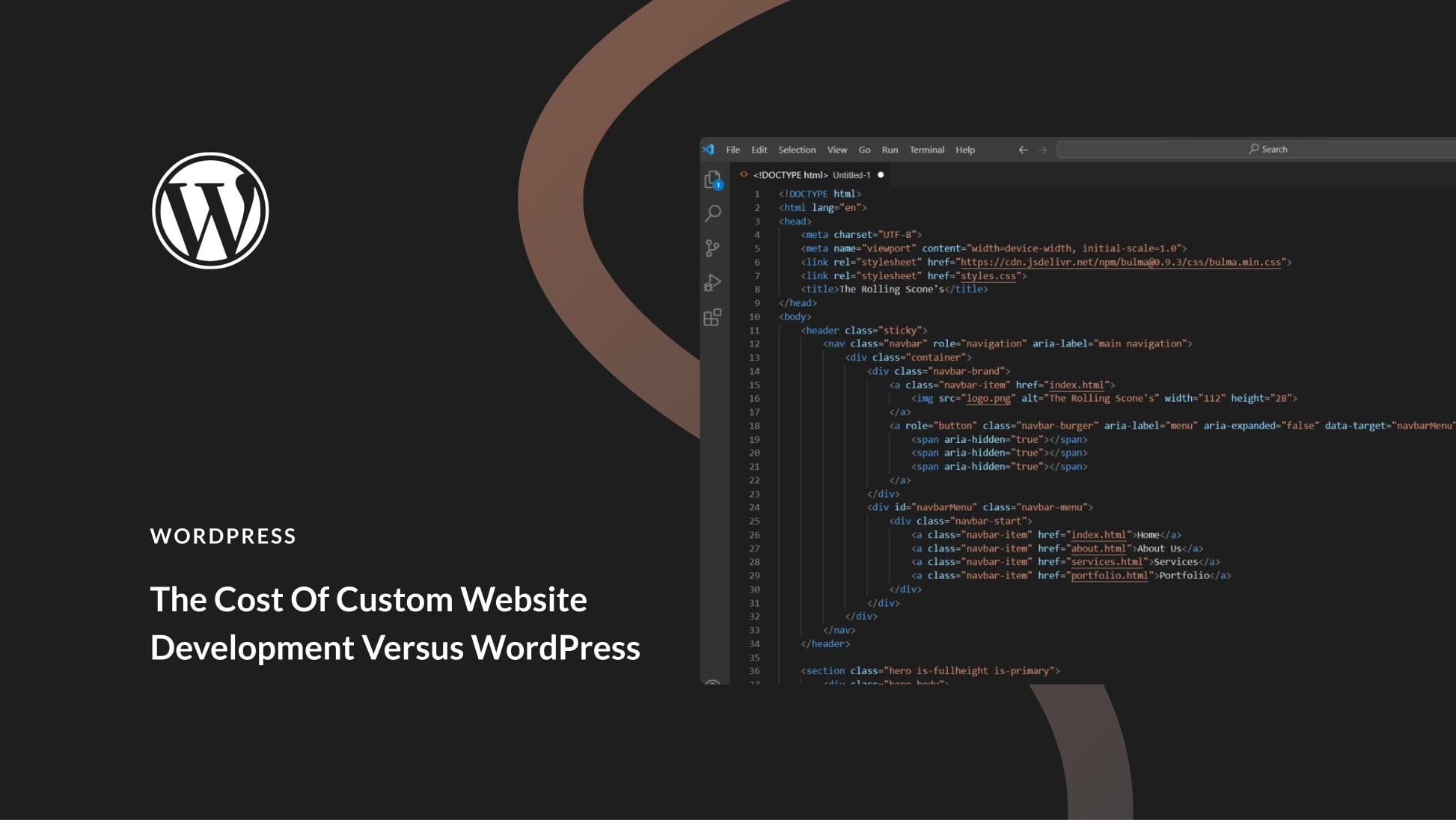
Appreciate the article, Kevin. I’ve started a few blogs over the past 3-5 years, but none of them are still around. I think many people underestimate how much work is involved—I know I did. These days, I see bloggers putting in 10+ hours a week with massive followings but little to show for it. In my opinion, the real key is conversions—building an email list and offering something to sell, whether it’s a book, jewelry, skincare products, or anything else.
Your information is exactly what I was looking for, so thank you very much for providing it. Would you mind telling me what program you use to create your amazing, fast website? For my business, I also want to create a simple website, but I need help deciding on a name and hosting provider. Asphostportal is reputed to have a stellar reputation. Exist any other options? If so, what would you suggest?
Thank you very much for your information; it is just what I was looking for. May I ask what software you use for your fantastic and quick website? I too intend to build a straightforward website for my company, however I require advice on a name and hosting. Asphostportal is said to have an excellent reputation for it. Are there any other options available, or can you recommend them?
Hi,
This information is excellent. I started creating my blog four months ago, and after reading this post, I understand why my blog has only had a little traffic. Thank you, Kevin, for sharing; I’ve learned a lot from you.
This is a great Post and I’m glad that you shared these ideas. Consistency is really very important when it comes to blogging. You write good information (and others can approve) about SEO, tips & trick, blogs, etc that from most of us learn a lot.
Can you please tell what is your experience regarding getting traffic from reddit.com and google+?
Very smooth read. Its going to be very helpful. Thanks broda…. cheers
I really enjoyed reading your post, I found these tips very helpful since I myself have ventured out and created a blog of my own. These tips especially the ones in regards to being professional and selecting an appropriate domain name really helped and made me rethink my specific choices I have made for my blog.
Wow! This is large and simply put. The truth is that I have desire long ago to be a blogger. It is either am lazy or scared that I may not make it through or that it may not sell out. Thanks for the update and great encouragement. I hope to start off soon. I guess I have to re-visit your site for more on how to start and stay on blogging.
God bless!
Woowww……that’s really damn awesome post man.
Thanks a lot for this informative post.
Excellent tips, Kevin.
Based on my experience, passion and persistance is the keys to reach blog success.
Thanks for sharing!
Wow, Really a great article. It was full of important tips. I like the article very much. It will help me. Thanks for sharing.
Very nice article. Real valuable suggestions. Thanks a lot.
this is really a great source for bloggers who are looking to make something interesting, There are so many things to do to optimize your site.
Hi, Thanks for the list! I just started blogging 2 months ago and I know from the start that I would someday be able to monetize my blog. As of now, I am working very hard on you #14 and it’s really not easy!
Hi!
This was all really helpful to read. I am still getting things up and running and I have faith that slowly but surely, I will get to where I want to be- but I just wanted to say thank you for such a great post and it is really appreciated! I have the same question as Ruth above. While it is obvious that my main topic is about food/recipes, I also talk about numerous other things that have helped me get followers from other aspects. Is there a way to handle this the best way in order to optimize the experience for other readers?
Thanks again!
-Joanna
i love this big… I am seriously considering a blogg but scared my friends think i i should and i want to… This is helping me already but can you please put help me out? HELP! Thanks mehn
Hey Quinna, we have a lot of articles here on the blog that should help you get up and running. Good luck!
Well worth the read – Thank you Kevin 🙂
I am totally new to blogging, but I was think that I will do some research first. On average I am asked at least three or four times a week where to eat or what restaurant is hot in my area. How can I tell everyone where I have been and what I know without so many phone calls or text messages. I thought a blog would be good. I know there are HUNDREDS of these, but I want to do a blog for folks who are looking for a great place to take a date or corporate lunch. What is that place you will never find anywhere but here. Any thoughts on where to start? Again, I willing to do the research…
Dear Kevin, I am not a blogger, but I am thinking I may want to be. I always love teaching and my dream would have been to be a public speaker who taugh about self improvement, what it takes to suceed. I built my business from nothing to Several million. I have many years of successful sales experience. Just thinking of sharing my years of success. Here’s a note I sent to a pastor on LinkedIn who was curious of how I got to where I am. What do you think? Thanks for your good tips.
About me to minister
Hello Pastor,. Thank you so much for accepting my invitation to join in your group on LinkedIn . I am a founder, CEO retired(58yrs old) had a liver transplant two years ago August. Thank you Jesus. In more ways than one I am a living
Miracle. Dirt poor young man, mom raised three boys she was a bartender. Sober in AA for 27 yrs! I started as a janitor and with good mentors , the grace of our Lord and Savior surrounded by angels and the breath of the Holy Ghost filled me. So from janitor to millionaire ! I pray everyday that The Lord will put someone in front of me so that I may allow them to SEE The Lord in me! Three grown children 3 grandchildren one divorce. Now with a wonderful woman I call my ” Everything” I was very, very ill while my liver failed, at Cleveland Clinic my everything (Natalie) was in the hospital EVERYDAY with me…months ! My surgeon said he was shocked I was alive , I would not have lived three more days. I serve a Lord of the eleventh hour! Lol
I felt something special when I saw you on line? I think it is the spirit in your eyes and your
Loving smile. That’s a thumbnail of me just to say hello. I am free to share my story if you have anyone that is in need . I love preaching! I am a servant.
Funny we connect today. No coincidences, Christinstences ! We are driving from Pittsburgh down 95 on our way to Jacksonville for a couple if days, then over to the Villages for a week or so!
Christ’s peace be with you. May your church prosper and have an over pouring of good into your greater community!
Sent from LinkedIn for iPhone
http://lnkd.in/ios
Thanks for mentioning KnowEm!
Thanks for writing this! It was an incredibly helpful read. I was especially zinged by your tip about taking time off to rest. I find blogging all consuming right now, especially as I am just starting off. This was a good reminder to chill out and have a life on occasion ;). http://truthandtravels.blogspot.com
I congratulate you Kevin for your great writing skill, and thank you for these inspiring tips! It is a great article!
Brilliant post! I’m still brainstorming on making my blog really effective and helpful to readers, all the while by maintaining my own interests for writing it. This article really helped! Thanks!
this is really a great source for bloggers who are looking to make something interesting, there are so much to do to optimize the website..
This is a great article, with really essential points for me.thanks for your valuable post.waiting for next post
Wow! I’m thrilled. I have been putting ideas together to enable me lunch my food blog this October and I’ve not summoned courage to do so until I stumbled across this article and all my fears of failure has disappeared having come to reality that readership takes time to grow . I’m now ready to kick start. Thank you very much for sharing this undiluted truth with us upcoming bloggers and im amazed at how u successfully replies your readers comments. I’ve learnt so much already.
Great article. I had the same questions as Amelia Jones What about the trending and the syndicated articles? Do these play a role in the content? Are these useful for the growth of business?
Thanks for sharing –
Jenn
What about the trending and the syndicated articles? Do these play a role in the content? Are these useful for the growth of business?
Hi! Interesting and helpful article!
I have a question for you. Is there a way to successfully launch a blog which addresses multiple topics?
I really love your article. I created my website from scratch with the help of you tube tutorials and to you guys.. Thank you for assisting us with the questions that we have in mind. This is very helpful. I have a question, since I just created my own website I’m not sure if I created it with a specific niche or did I created it in a broad topic. If you have time kindly please visit my site if what can you comment about it I am more than happy to accept any comments because this will help me a lot. Here is my website http://www.lifestylenurse.com
Kris
Very useful information! Thank you!
thanks for your valuable posting it was very informative. i am working inErp In Chennai
Hi!
Awesome it s a very inspiring article. Actually I am new in this field and trying to learn the art of blogging. Hope to get your continuous advice and info.
Kevin, it’s been really helpful reading through the list of truly great content,
comments and feedback.
Forgive me if you feel my questions are in the wrong place. However, I’m going around in circles after weeks of research.
For a someone who has never dipped their toes into wordpress websites and blogging.
I’m trying to navigate the correct path and not waste time and money.
Could anyone be kind enough to find as many holes or suggestions?
I should consider.
My background is in the I.T industry, designing and building datacentres. Power, cooling and infrastructure.
Having been out of the industry for 5 yrs. So much has moved on, and the majority of my competitors no nothing about blogging or optin pages, let alone websites that work on mobiles etc.
So, I’m trying to select the right approach and best practices to hopefully dominate my competitors who have more money than sense!
(David and Goliath approach!)
1- WP website-with a responsive corporate look and feel theme.
2- Offer free relevant content or book to download through
some kind of optin page plugin, linked to an autoresponder
to collect email addresses.
3- Record webinars or interviews of people or products to YouTube
to get better higher google searches.
4- Find a tech blogger to write relevent articles once a week for the company’s blog. (as you can tell my writing / grammar is not good enough)
5- Use social media including Linkedin to engage and build more awareness. Or go down the streaming live route before it gets clogged up.
Apologies to anyone who finds this is in the wrong place.
The feedback here has been truly encouraging.
All the very best
Nick
Hi Nick,
Yes that sounds like a sound way of collecting email addresses and growing a newsletter.
If you are only publishing one article per week, make sure it’s a good one, as that is a low posting frequency.
Also, If the plugin you release is popular, you may find you can grow your list a lot faster than you imagined.
🙂
Kevin
Hi Kevin, thanks a lot with this inspiring article. I’m really a new rambler on the blogosphere. Actually, I was convinced by my husband to make a blog for something that I’m passionate about (while try to (maybe can) monetize it), and now by reading this, I’m more encouraged to do better. Otherwice bothering your time to explain, (from point 5) does it no good if put up banners on the new blog just like I have?
Hi Rheena,
In the past, I used to think that there was no harm in adding banners to a blog from the start as people are used to advertisements being displayed on websites anyway.
Now I can see the downsides to adding banners from the beginning.
The main focus at the start of your blog’s life should be traffic and readership. Banners can affect this growth if your website design is saturated with ads. I do not believe that this is worthwhile as you will make very little money from the ads; therefore it is better to focus on growing your readers with a minimal design.
For me, #9 , #10 and #13 are definitely key (next to the more obvious ones :D). Great interesting content in combination with regular updates on the blog is one of the keys to getting an active community around your blog.
Networking with other bloggers helps evolve your blog as time moves on. However, I feel that sometimes bloggers seem to focus too much on this.
#16 – agreed. If someone doesn’t agree with you…. that’s alright. In fact it’s kind of cool because they did take the time to argue.
Monetizing a blog is in some parts overrated. If you follow #9 and #10, requests should come in automatically. Also, the strategy should be flexible. One monetization option might work for one blog but not for the other. My personal favorites are:
1. Affiliate marketing – give various brands / products a try and see which one works best
2. Sponsored Post – Be careful with Google here. Either you run the marked as “sponsored” with nofollow links strategy or you go all out with follow links. I can recommend teliad and linkworth here.
Keep up the work Kevin
Thanks Ryan. Will do my best 🙂
This is the first and only blog I follow and I look forward to it daily. Keep up the good works that you and Elegant Themes do for us Rookies. I have learned so much in the last few months. Thank You
You’re welcome Gloria 🙂
Thank you, Kevin! As a ‘new kid on the blogging scene’, I feel like a sponge, soaking up information about blogging from wherever I can. I feel like the more I learn about it, the less I know about it!! It’s like a parallel world out there LOL In any case, I found your tips extremely helpful! Much appreciated! 🙂
Glad you found the article useful Simone. 🙂
Number 18, in the 2nd sentence I believe you meant ‘responsible’ instead of ‘responsive’. That’s muscle memory for you hahaha!
Thank you for posting the article! It’s fantastic to get such a holistic article about serious blogging.
Thanks for spotting that William. I have used the word responsive so much in the last few years because I speak about WordPress so frequently. Will need to watch out for errors like that in future 🙂
I was about to clap and also to mourn at various points. Where I almost start to mourn I found what I needed to move to the next level with my blog. Thanks
Great post and great Rio picture, Kevin! 😉
Thanks for sharing!
You’re welcome Jorge. Wish I was back. Will probably be going back to South America in June for a holiday 🙂
Thanks for the inspiration! A lot of your tips above can also be applied to general website marketing. Great article, thanks!
Glad you liked the article Bonita.
Nicely said. I started a blog about my hometown and then later realized it would take me about 400 hours to put it completely together. Wow. And it stalled. So like you said I have to make a plan and be consistent. I’m going to keep going after I regroup but it reminds me of the phrase “a journey of a thousand miles starts with one step”. Every time I stall, I have to start the journey again. lol
I have stalled on a lot of projects myself. There are so many hours in the day. 🙂
Hello Kevin,
I think you wrote a very useful article about/list of things to think about when you start a blog. It covers all important areas. Good job!
Cheers!
Rick
Thanks Rick.
I’d like to point out something that can be used to check grammar. It is a great tool that is targeted to academic level writing.
http://www.Grammarly.com
Thanks for the tip Joseph. I am sure a lot of readers will find that useful 🙂
Awesome article….
Thanks for this type of content…
You’re welcome.
You are Awesome Kevin 🙂
I have blog and I regularly post latest WordPress themes and plugins reviews on my blog, but I didn’t know deep knowledge that you share in this post.
Such a useful information for me and other bloggers. Thanks for share
You’re welcome Dipak 🙂
It’s great information. I start create my blog 7 months ago, I’m understand why my blog have a little traffic after read this post. Thank you Kevin for your sharing, I learn a lot from you.
You’re welcome Sasono 🙂
Great article! Now if only I had more hours in the day to keep improving my blog. I should really be reading articles on how to get my 4th baby to sleep through the night. You’re a smart guy. Got any ideas? ; )
haha Sadly, that is not an area I have any experience in (yet). 🙂
The ET Blog became such a wonderful resource in a very short time. It is now one of the few blogs I visit on an almost daily basis. I read a lot of articles like this one – and a few others – in the past, none satisfied me as much as what I can find here.
Keep writing.
Glad you are enjoying our articles Alexe. We will do our best to keep up the same standard of posts 🙂
I’ve been blogging — with the same domain name — since the mid-late 90s, but I follow many of your tips. I guess I just picked them up along the way. Ironically, the one thing I have never done (and don’t ever plan to do) is monetize the blog. Mainly because I don’t want any ads, pop-ups, or anything else that interferes with the content.
That’s not to say the blog doesn’t profit me. It’s one of the ways people in the aviation industry know my name, and it’s hard to put a price on that. I’ve written for magazines, other web sites, and major industry publications simply because people found the writing on <a href="http://www.rapp.org/my site worthwhile.
So just because you’re not pulling in ad revenue from your web site doesn’t mean it can’t help you toward things that DO raise your profile, help you find work, and so on.
I think the best tip was to pace yourself. Hard to believe I’ve been blogging for nearly 17 years; just remember, it’s a marathon, definitely not a sprint.
You do not need to place advertisements on your blog in order to make money from it. My own blog only has one banner, and that banner is for my own discussion forum.
You can promote products and services through a blog without displaying advertisements throughout the design.
However, it does sound like your the purpose of your blog is to raise your profile and generate more clients. If that is the case, then I can see why you may not want to display any ads.
🙂
One of the things I love doing is taking my YouTube videos and turning the transcripts into a Blog Posts.
That way I get to deliver both written and visual content, appealing to more people.
The key to blogging is Content. Yes, it’s good to “be regular”, though we cannot always be. Success in Blogging comes from writing / producing content that’s SO GOOD people will wonder why they didn’t have to pay for it.
It needs to be SO GOOD that it’s share-worthy. At least, that’s my take on it 😉
Do you pay someone to convert your videos into transcripts?
Oh my! This blog post is so needed for every newbie to blogging and for people like me who are 18 months plus into blogging.
SHOUT FROM THE ROOFTOPS — Blogging takes time. Good blogging needs MORE time. Excellent blogging … see “good” and add experience. I had read that a good blog took time. And I had done several Intranet “blogs”. But I had no idea.
Here is where I think (MHO, OC) the main time factor is how technical your blog is. My site is about genealogy & I did pick a niche that I felt was not being addressed — how to organize (and keep it that way) all the genealogy facts & files one accumulates. Lots of it is technical & if you as the blogger are making *recommendations* then they better be the best you can provide. I doubled the amount of time I thought it would take to do a good blog article & I was still off by 100%.
I read that it is best to start your blog WITH the monetizing in place. Be aware that there are rules — government rules with liabilities — about working with affiliates. I choose to not sell spaces on my site. It tends to turn off the very people I want to attract. I also choose to ONLY have affiliates that pertained to genealogy. Personally I hate to go to a site that has ads all over the place for things that have nothing to do with the purpose of the site.
I did not give it a few months — I gave it 12 months. A full year. And did not make ONE sale on several products that everyone either has or considers buying. Staying up with the affiliates — providing little extra ads, which might result in a sale, on a special offer took time. Sadly, some affiliates use 3rd party providers to handle their affiliate sales and those pepper you with emails trying to get you to sign up for ANYTHING they have. I still get them — even though they have been notified I pulled the plug.
After a year, I stepped back and looked at my site as far as time needed. Was it being helpful to others? Yes. Was I satisfied with what I was providing? No. Was I able to stay faithful to my original niche? Not in the way that was satisfying to me. So what should I do? Drop the whole thing? Or morph? While on a three week vacation where I could NOT blog due to poor internet connectivity, I carefully went through my options.
Wish I had this article when I was making the decisions. Facebook has a group that started last year that provides a LOT of organizing your genealogy information. The problem with it is older posts are lost. The good of it is reasonable, good — even great — responses to queries. Better than what I could have provided.
I debated about giving up my site completely but decided not to. I already pay for the hosting services so that is not an extra expense. Only the domain renewal is. Because ET is the way it is with themes, a change of theme is not a cost factor either. The focus will still be on genealogy organization but will be on suggestions made by myself as well as others and results.
I have a domain for life that has never been used properly. So I’m creating a general site in WordPress that will have sections on WP, Kindle books, travel, etc. THAT site will be *my* fun space & will provide some help to others. It’s taking some time to get there. Life tends to intervene where my time is concerned.
Of course I use Elegant Themes. My host company is excellent. I did a LOT of things right. During the time above I was learning about WordPress as well. More knowledge about WP would have cut the time needed for blogging. Sooooo be aware new blogger, if you don’t know WP — don’t think you have to learn it first. Just be aware that it will take you more time for awhile to blog a new article.
And take Kevin’s list seriously — VERY seriously. It’s excellent!
Best of luck with your blog Lynda.
It sounds like it is a good niche to target as there are few competitors. By focusing on a niche that is not saturated, you can gain a lead simply by being one of only players in town.
If you can find the right business model, you could make good money through your blog.
Amazing…………
🙂
Very inspiring article kevin (enjoyed your look 🙂 )
These days many people start blogging just to make money and they fail, if making money is the primary goal of a blogger then the chances of getting success is very low.
When we consider blogging as passion and a medium to share our thoughts and creativity success is yours.
“Money is a powerful motivational tool, but passion is what really motivates you”
Yeah I think that whilst we all need to work for money, you do need to still enjoy the act of blogging itself. I see a lot of people trying to make money from blogging and they hate writing. Makes no sense 🙂
A lot of premium tips kevin, you did it again! I love your write up and WPMods is really a good site. However, I got informed about this;
“While it may be worth adding banners later to help monetize your blog, in the beginning, your main aim is to establish a readership”
Its a wonderful tip and that is what I was missing when I setup 2 blogs withing 4 years and non made money online but made money offline because I start teaching people around me and selling ebooks and software with setting up WordPress.
With ET powerful tips and lovely responsive themes, I have no excuse not to succeed on this new one. You can’t stop me Kevin on blogging on the way of life (Christianity) which I’m passionate about… :D.
Thank you very much for your premium tips.
WPMods.com was actually merged into WPHub.com. I still write for them occasionally too. They’re run by some great guys.
Glad you enjoyed the post. I used to try and monetize blogs from the first day, but in hindsight, this was not always the best thing to do. It is usually better to try and focus on content and not distract readers; particularly as banners will not bring in any significant revenue at the start anyway.
Kevin
Hi Kevin,
Wow, you’re a prolific blogger. And your topics are so practical and useful. This one was great.
Do you have any secrets for producing good quality long posts so quickly?
Thanks for continuing to produce such helpful articles.
Laura
Hi Laura,
Who said I produce them quickly :):)
I normally spend most of the day writing the articles I publish on Elegant Themes. I need to spend time researching the article, cropping images, testing plugins/services etc. Then I need to proofread everything at the end to try and pick up my own errors (sometimes the odd error slips through – that I am only human!).
When writing long posts, I think it is important to structure the post out beforehand. If not, it is easy to go on a tangent and not focus on what is important.
For example, for a post like this I broke down what I considered to be the main points. Then I try and ensure that each point is of a similar length. This is obviously not an exact science; but it makes no sense to have one point that is ten paragraphs long and another that is only one. There needs to be some consistency.
Kevin
Excellent post Kevin… Thanks, I.
Glad you enjoyed it 🙂
This is a great article, with really essential points. Especially like #1 and #10. Right on target. Thank you!
You’re welcome Joel 🙂
Very nice article. Real valuable suggestions. Thanks a lot.
tom
You’re welcome Tommaso 🙂
Thanks for this article Kevin. I started several blogs 3-5 years ago, none of which exist today. I think people under-estimate the work required – I sure did. However, I see people today that work on their blog 10+ hours a week and have nothing to show for it – even with huge followings. Conversion is the key IMO – building a list and selling something to that list – whether it is a book a necklace, lotion, whatever.
You are right on the money with that. People underestimate the work required.
I developed the two blogs I sold to a level where they generated over $2,000 a month. However, to get there, I essentially worked on them like it was my full time job. I took a pride in those blogs and was always looking for ways to improve them. That kind of dedicated is needed to make a blog successful – well, unless you have a large budget 🙂
As you say, conversions are key. I think it is vital to think about the business model from the start and plan ahead. Through my personal blog, I am using it to promote my discussion forum, though I will also be making money through affiliate commissions and paid reviews.
I especially love #20. Its a very important detail that most people forget from time to time.
I forget it myself from time to time. Though when work has to be done, it has to be done 🙂
Considering that I just launched a blog, this post is an eye opener for me. Thanks a lot for taking time to share your valuable tips with us.
You’re welcome 🙂
Hello Kevin,
Thanks for this article. I think that 2 of the most important things in this list are :
1. networking with other bloggers in your niche
2. building an email list
Of course you need engaging, unique and useful content. But if you don’t promote it nobody will read it. Building an email list is, in my opinion, essential to monetize your blog. I made this mistake when I just started blogging. It was a real eye opener. Also make sure you have a great free giveaway to convince people to sign up (I am writing my Ebook at the moment).
On my blog I just wrote an article about mistakes beginning bloggers make. Maybe it’s a good addition to this article. Here is the link if you guys are interested: http://want2discover.com/how-to-blog-effectively-making-19-beginner-mistakes/
Ow yeah also a good tip about using Divi. I really like this theme and I recently switched to it (I used modest before)
Cheers,
Bastiaan
Don’t feel bad. I made the mistake too 🙂
I didn’t start collecting emails seriously for a year or so after starting. I could probably have a list of over ten thousand if I kept it going from the start.
Good article. Be sure to add social media sharing links so that others can share it. Be sure to change your favicon too. You are using the favicon for HostGator at the moment 🙂
Thanks for a quick refresher course on blogging 🙂 if you ever noticed companies are a lot of times the blog on their site and it has three or four post that they never update again. People need to think about blogging differently related to their business. It’s a core part of their promotion.
I had a super successful blog a few years ago. Unfortunately it was an anonymous blog that criticized a public figure had been doing wrong (think Bernie madoff). That Blog was not only a learning process bu was one of my greatest accomplishments. I wish I could’ve monetized that blog because I would’ve made scads of cash.
Blogging is an art from and it takes a while to master but when you have dedicated followers that really enjoy reading your expertise it’s extremely fulfilling!
Companies generally do not commit the resources to a blog in order to get any benefit from having one (by resources I mean time and money).
If you can develop a blog that is popular in its own right, it not only raises the profile of the main company (or product/service), it also leads to more sales of your product.
I think Elegant Themes are doing everything the right way with their blog (of course, I am biased in this view). They are publishing content that helps customers and non-customers alike.
The hardest part about blogging is getting it started. Getting the first few thousand followers is the hardest, but when you get there, it is just an issue of keeping the momentum going and reinvesting back into the blog.
🙂
Kevin
Very nicely said, Kevin. I admire Elegant themes for having such good blogs and content, it gives them a better image with customers and potential customers.
I am starting with my blog and sometimes it can be quite tedious when you don’t see results. What you said about getting the first thousand followers cheers me up knowing it can become easier.
Cheers!
Wow, this is really an extensive list and you have covered so many important areas. I also think it is very important to build a network of like minded bloggers where you can share ideas, articles, and support each other.
Glad you liked the post Aqiyl 🙂